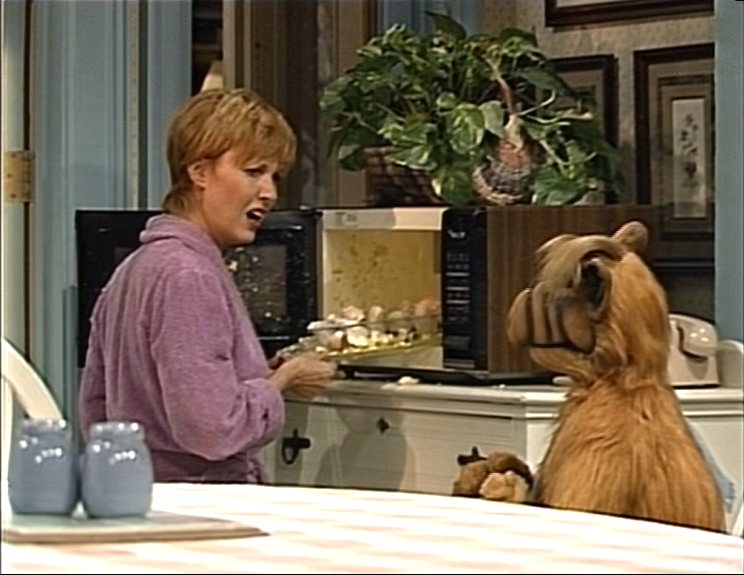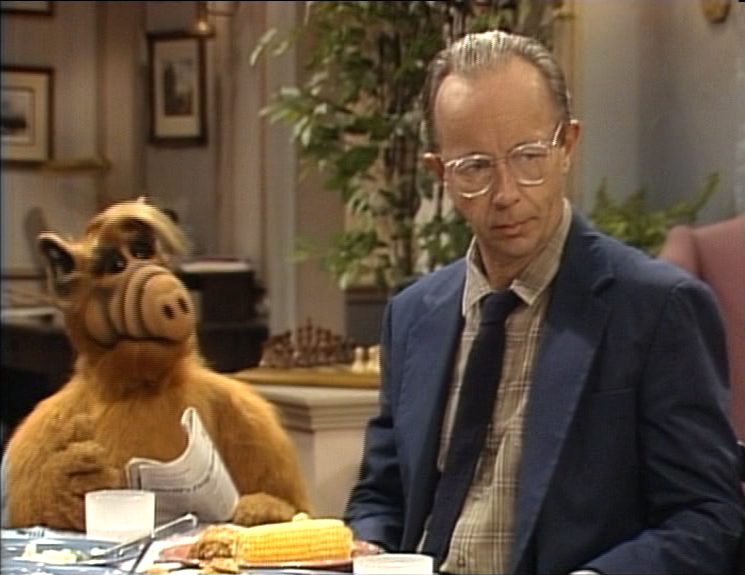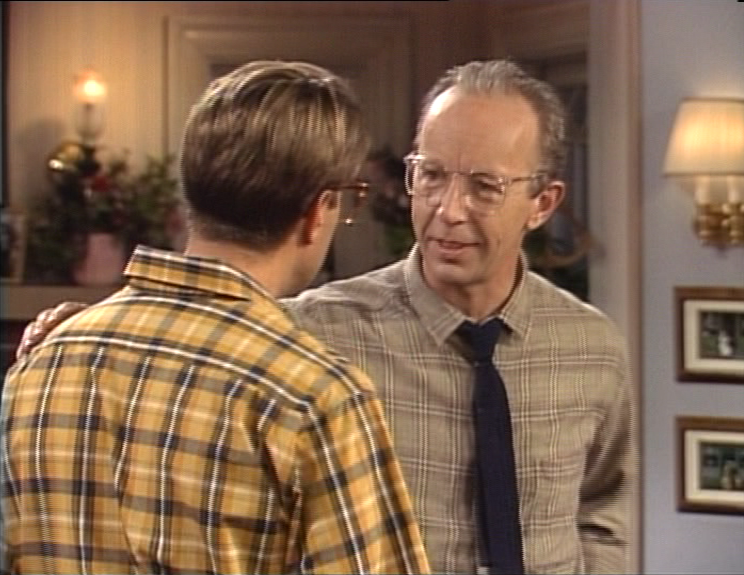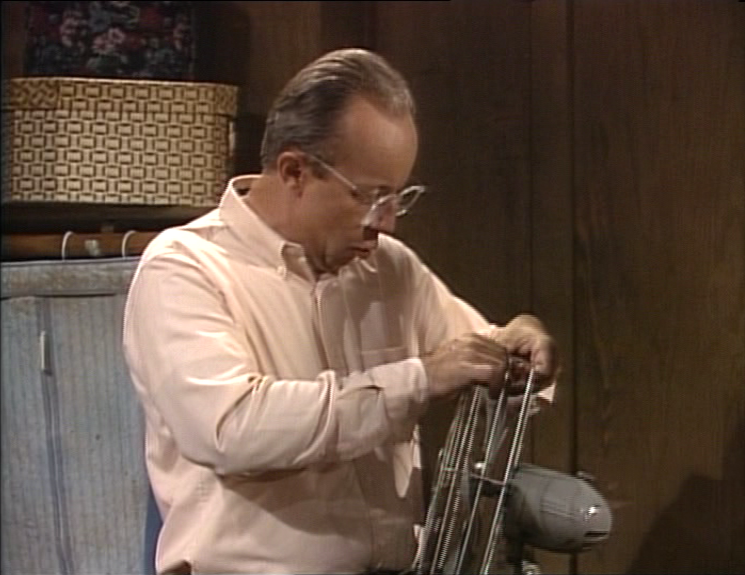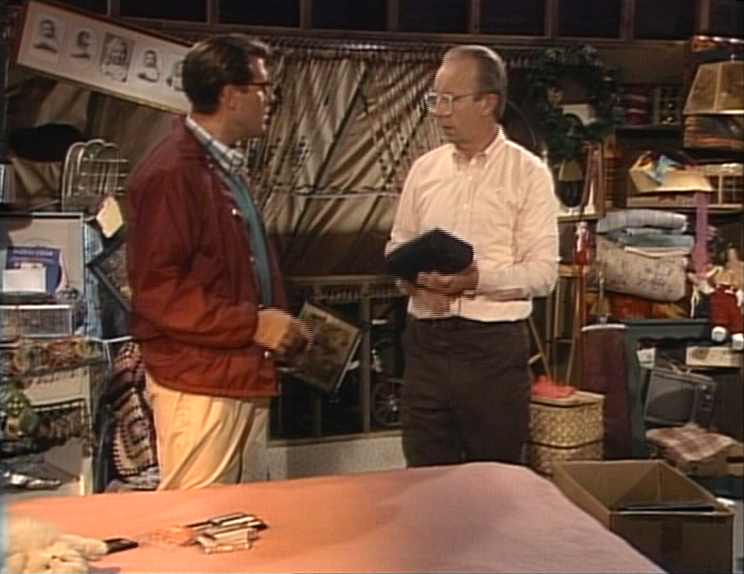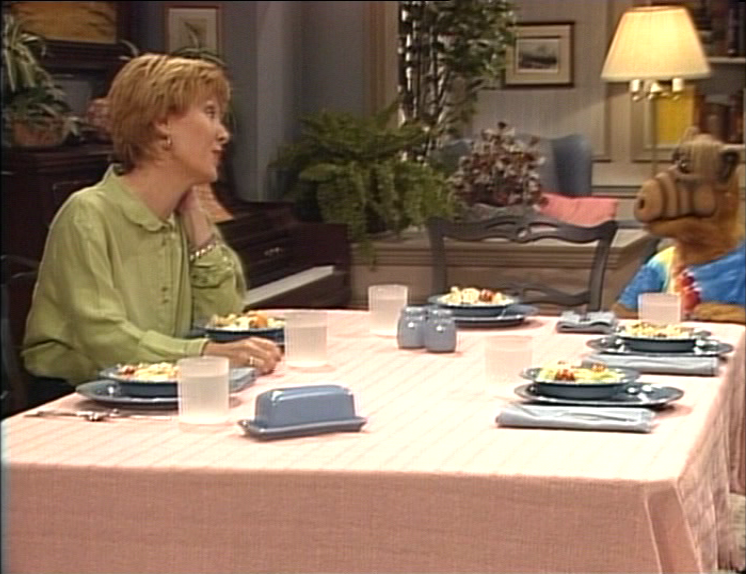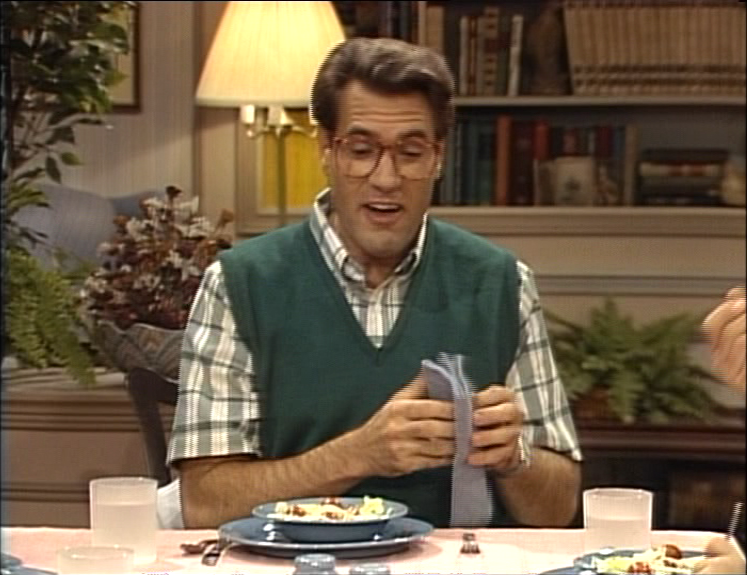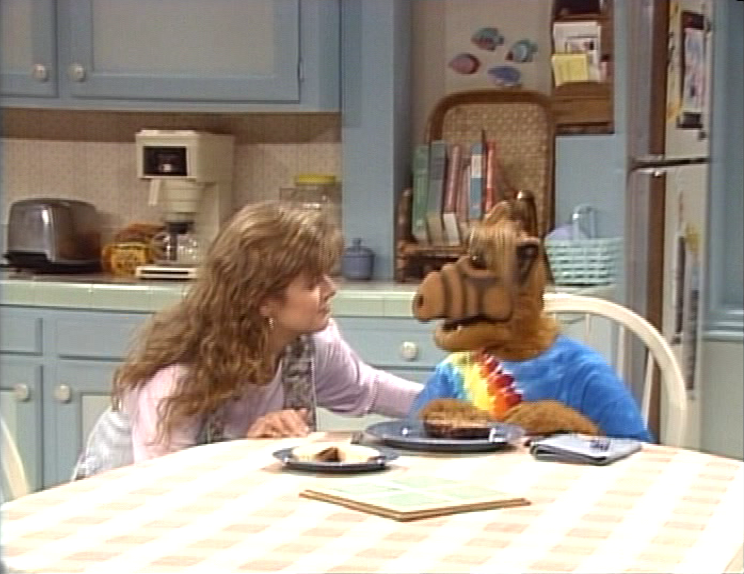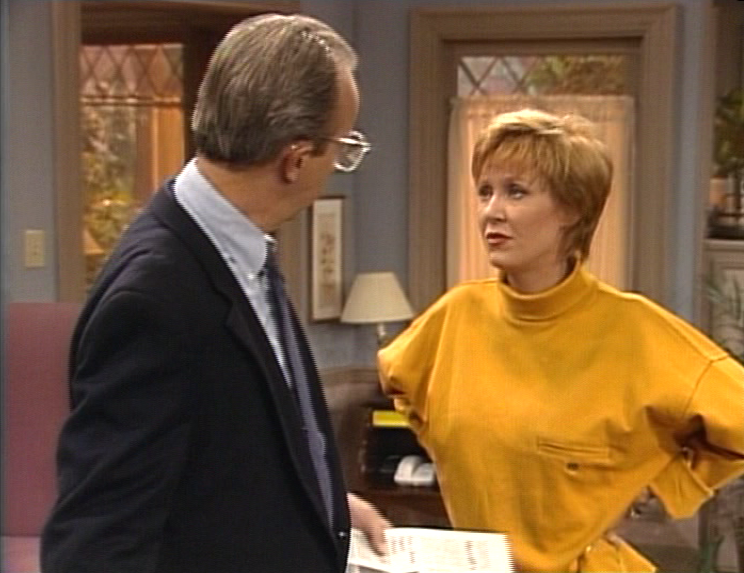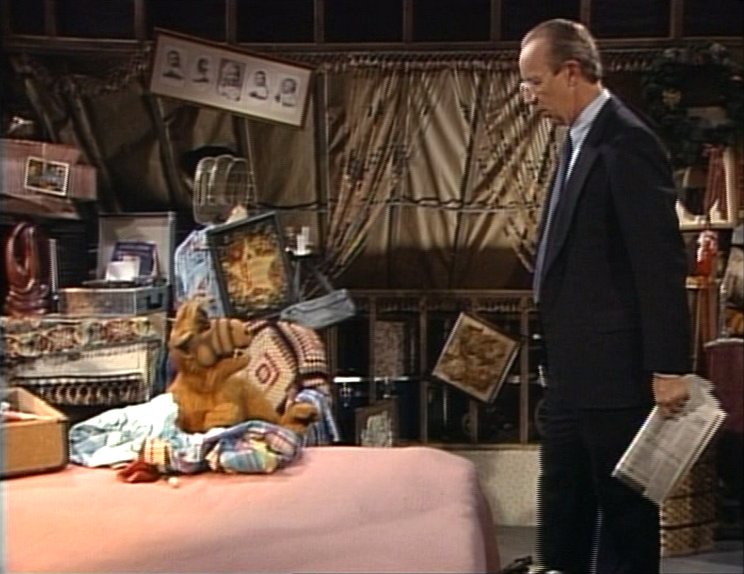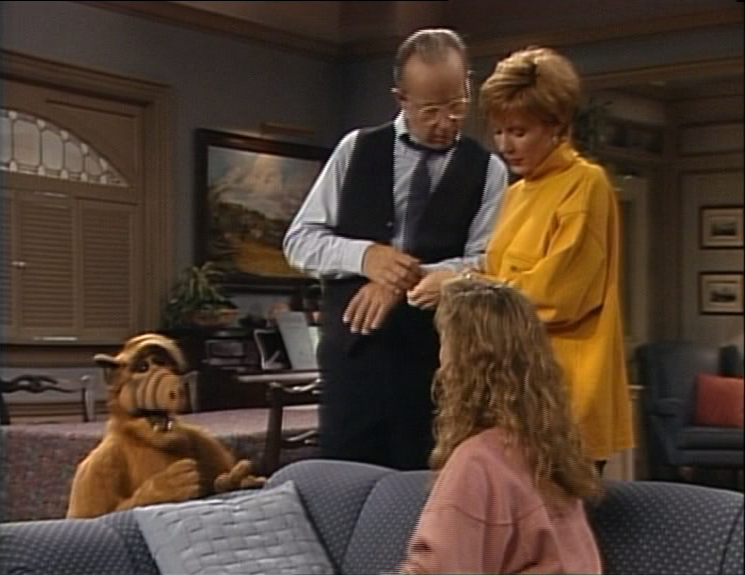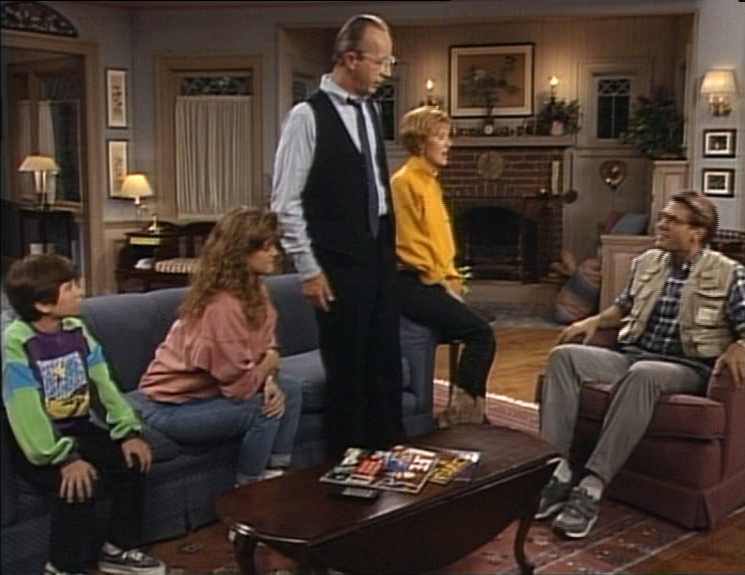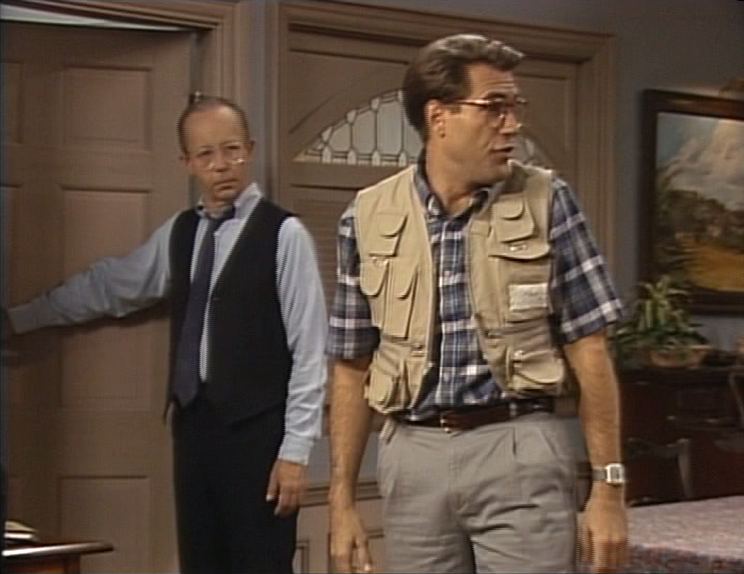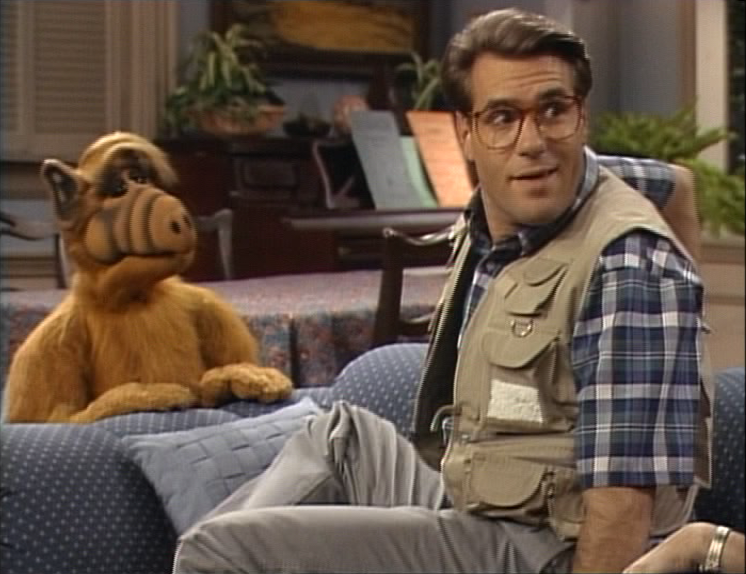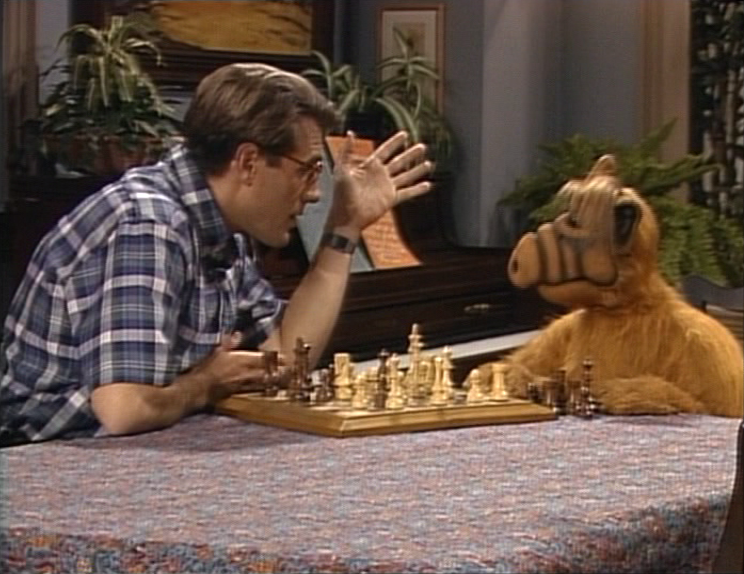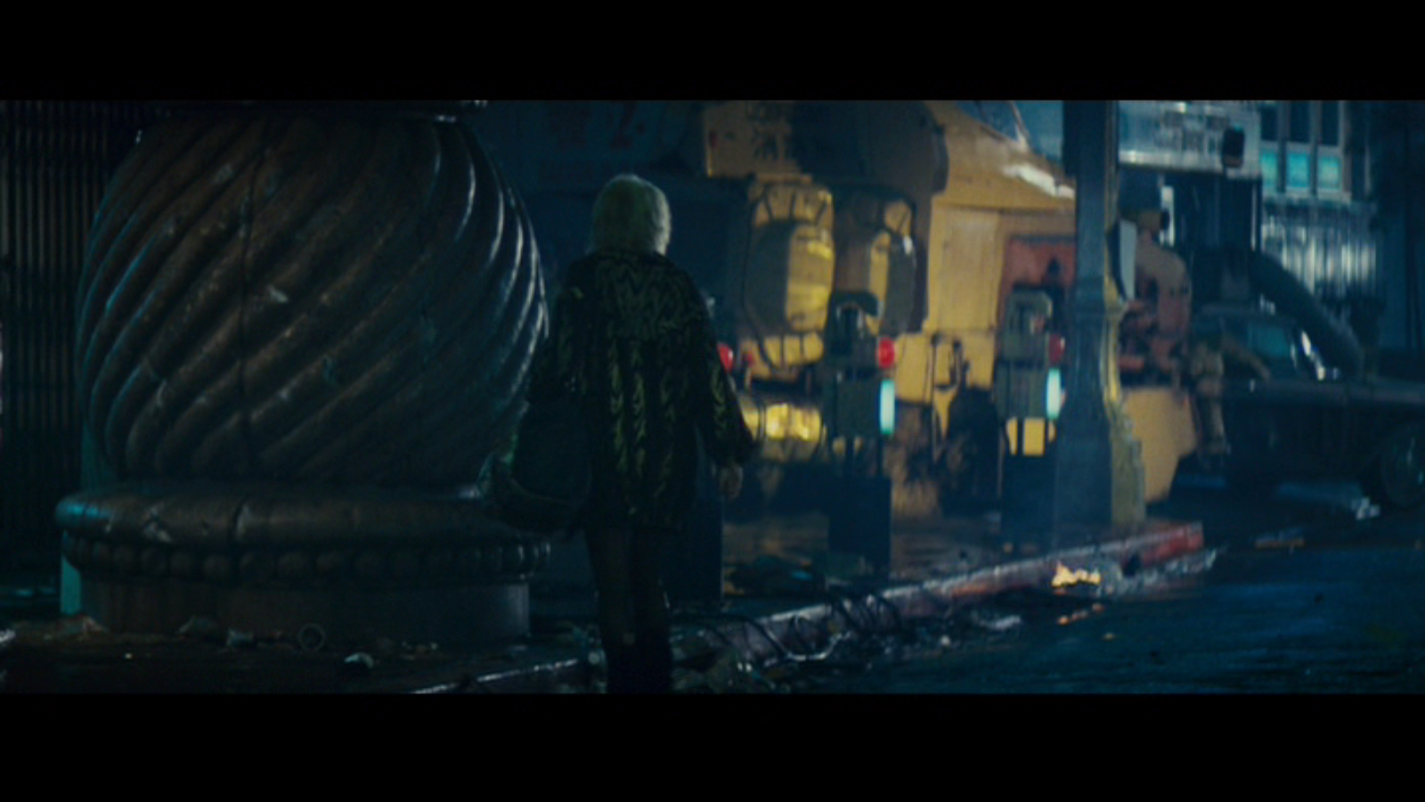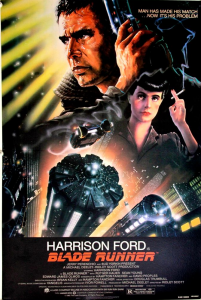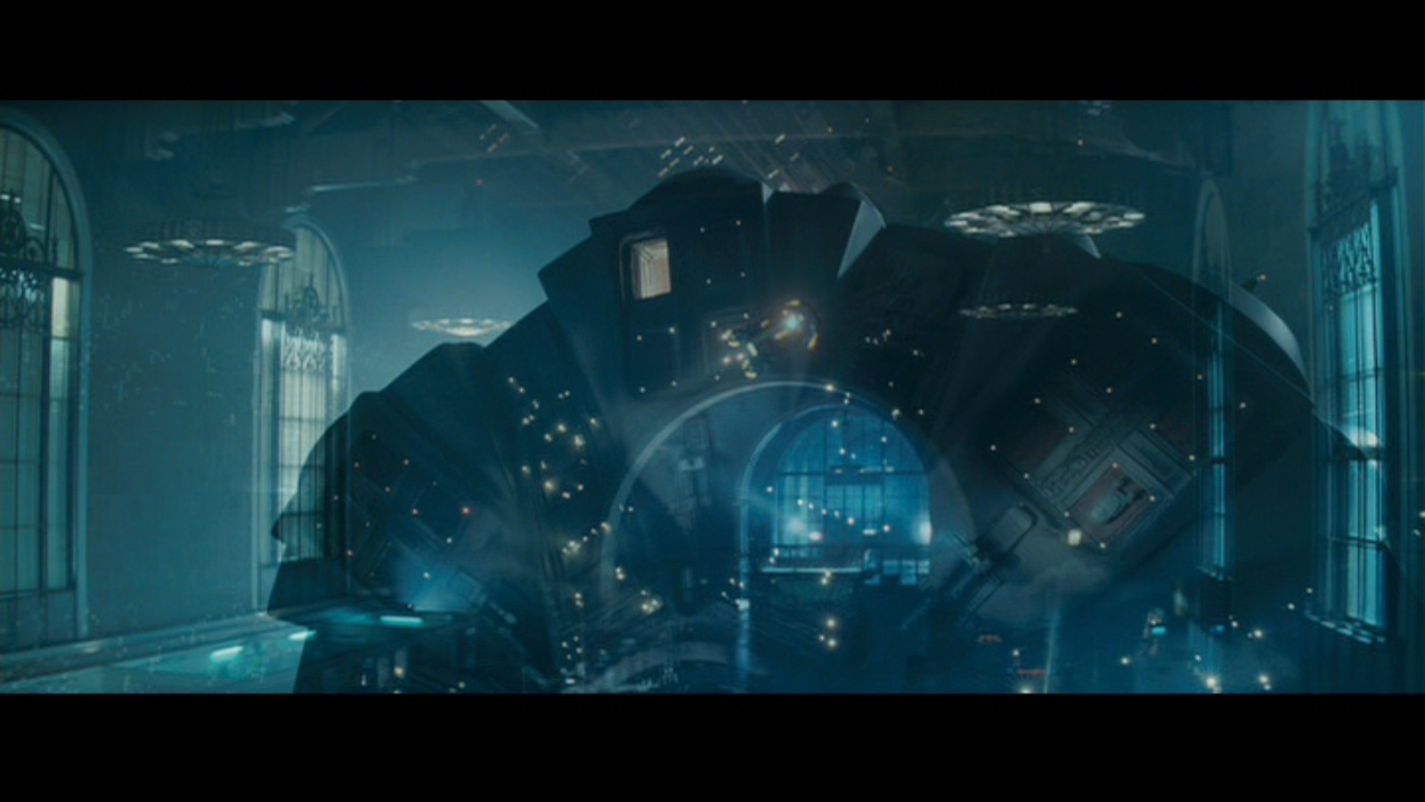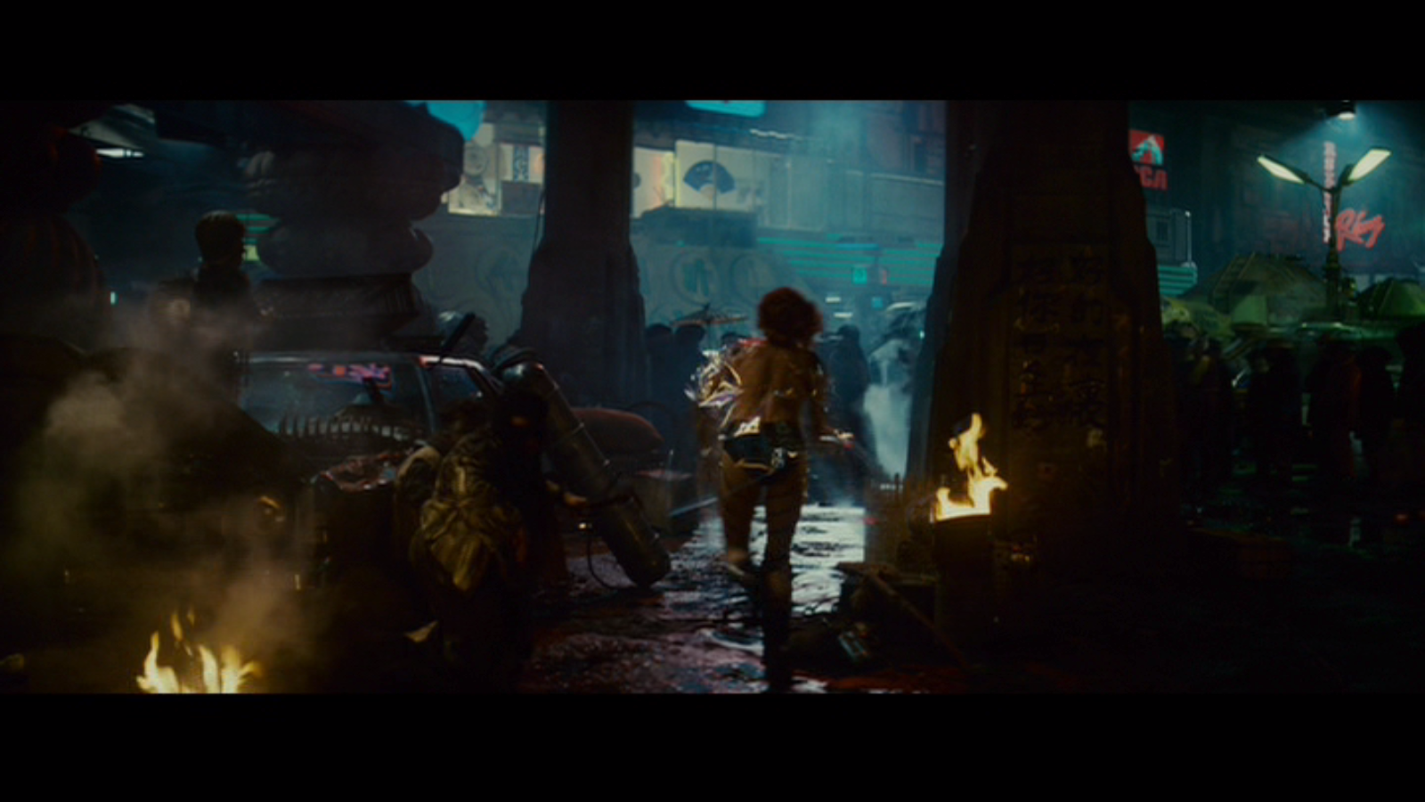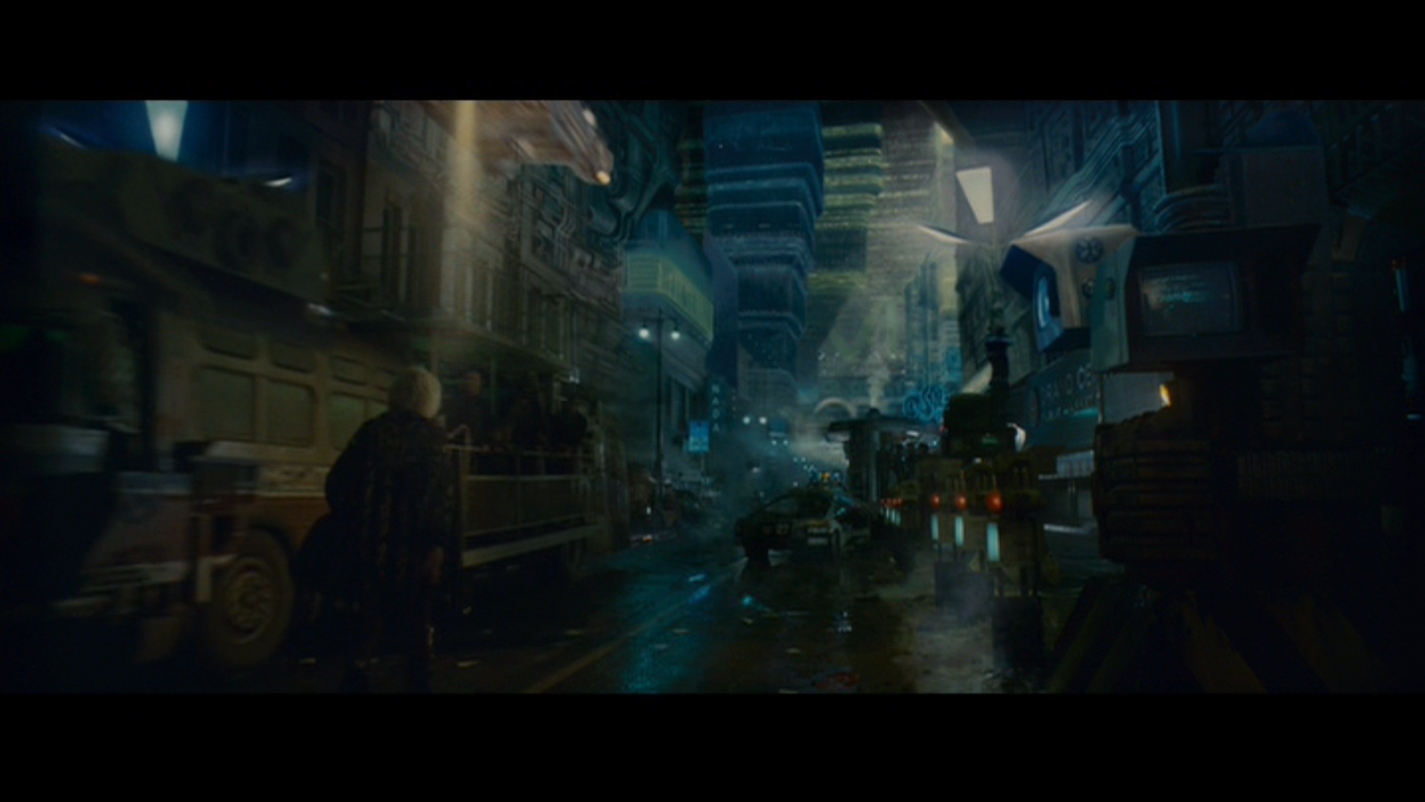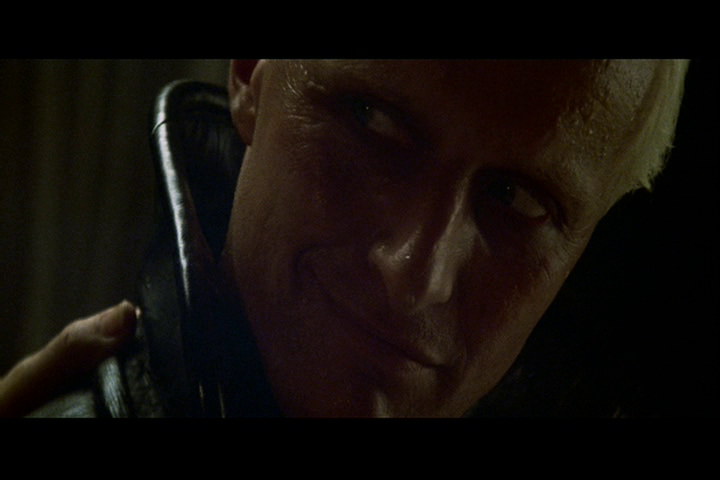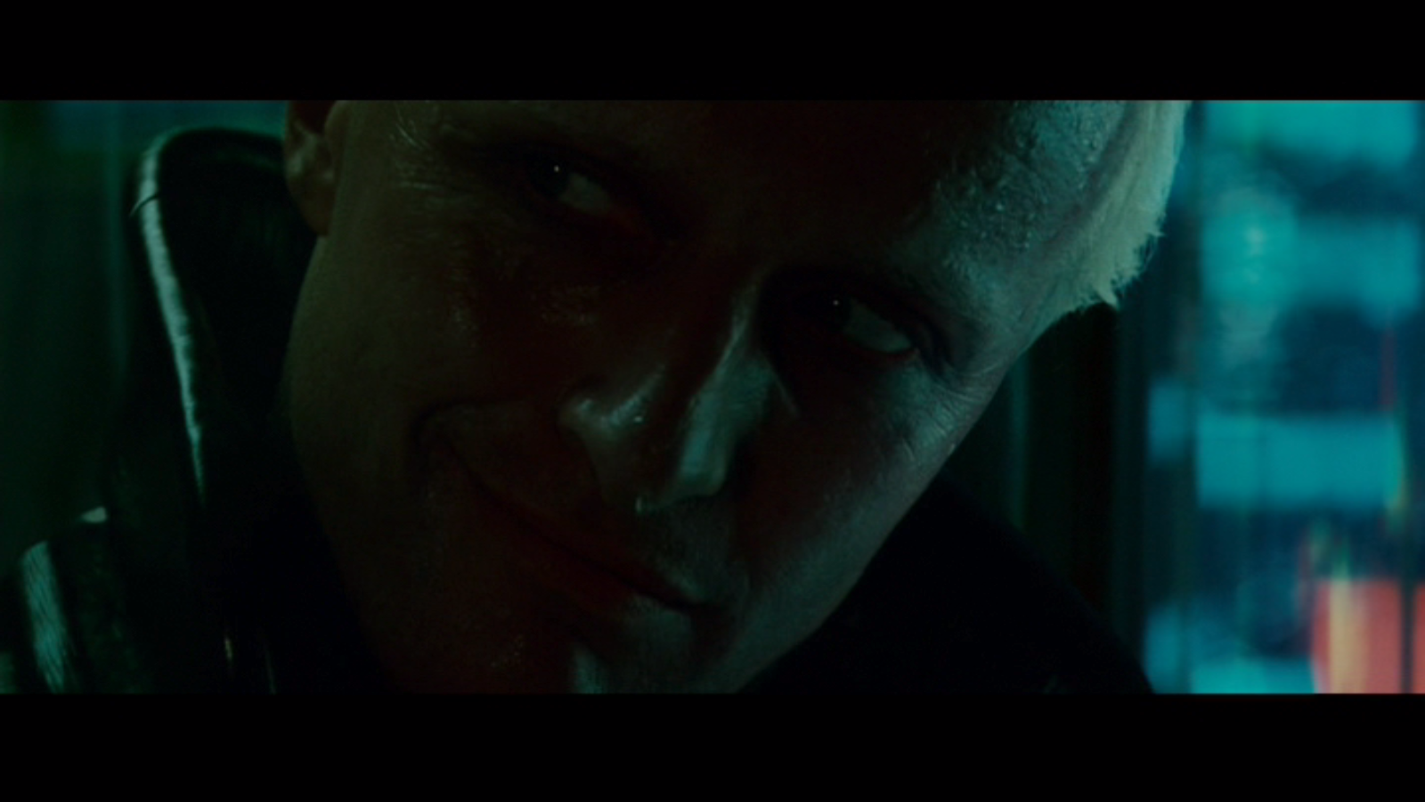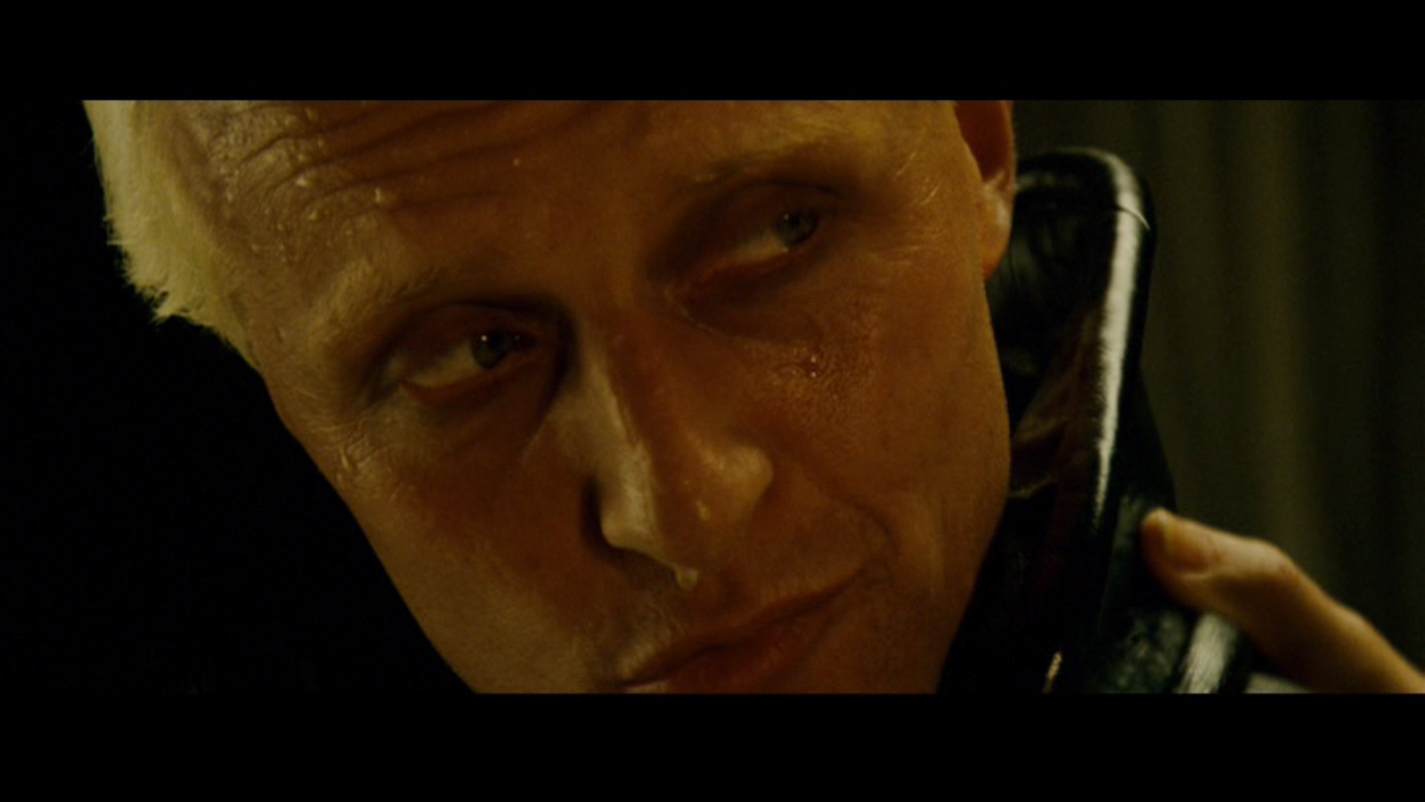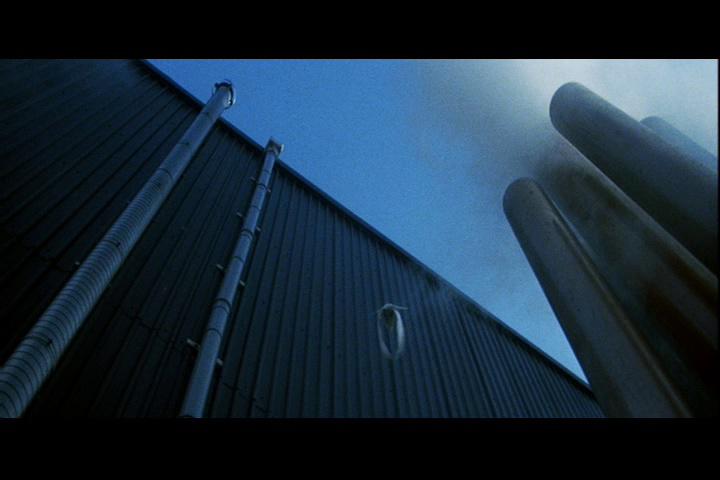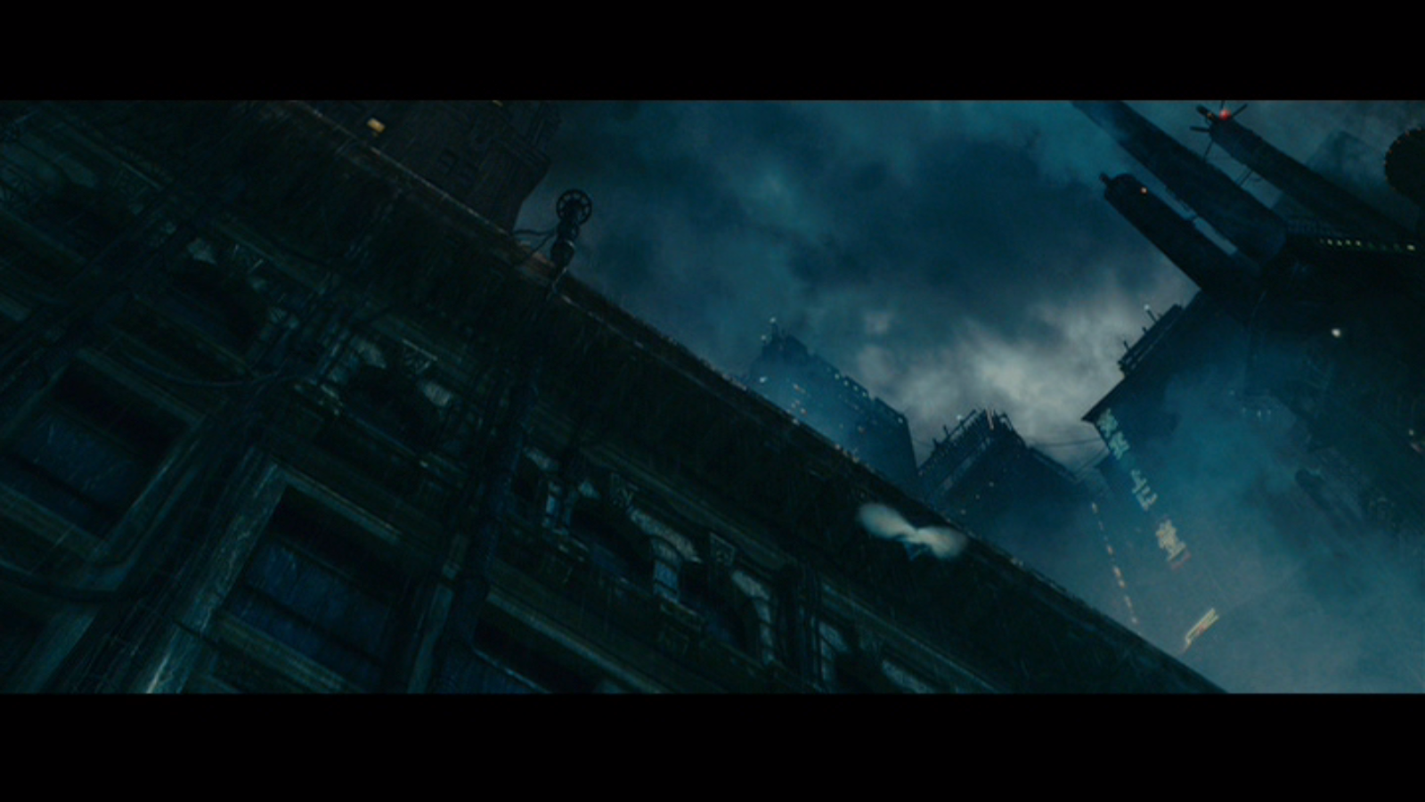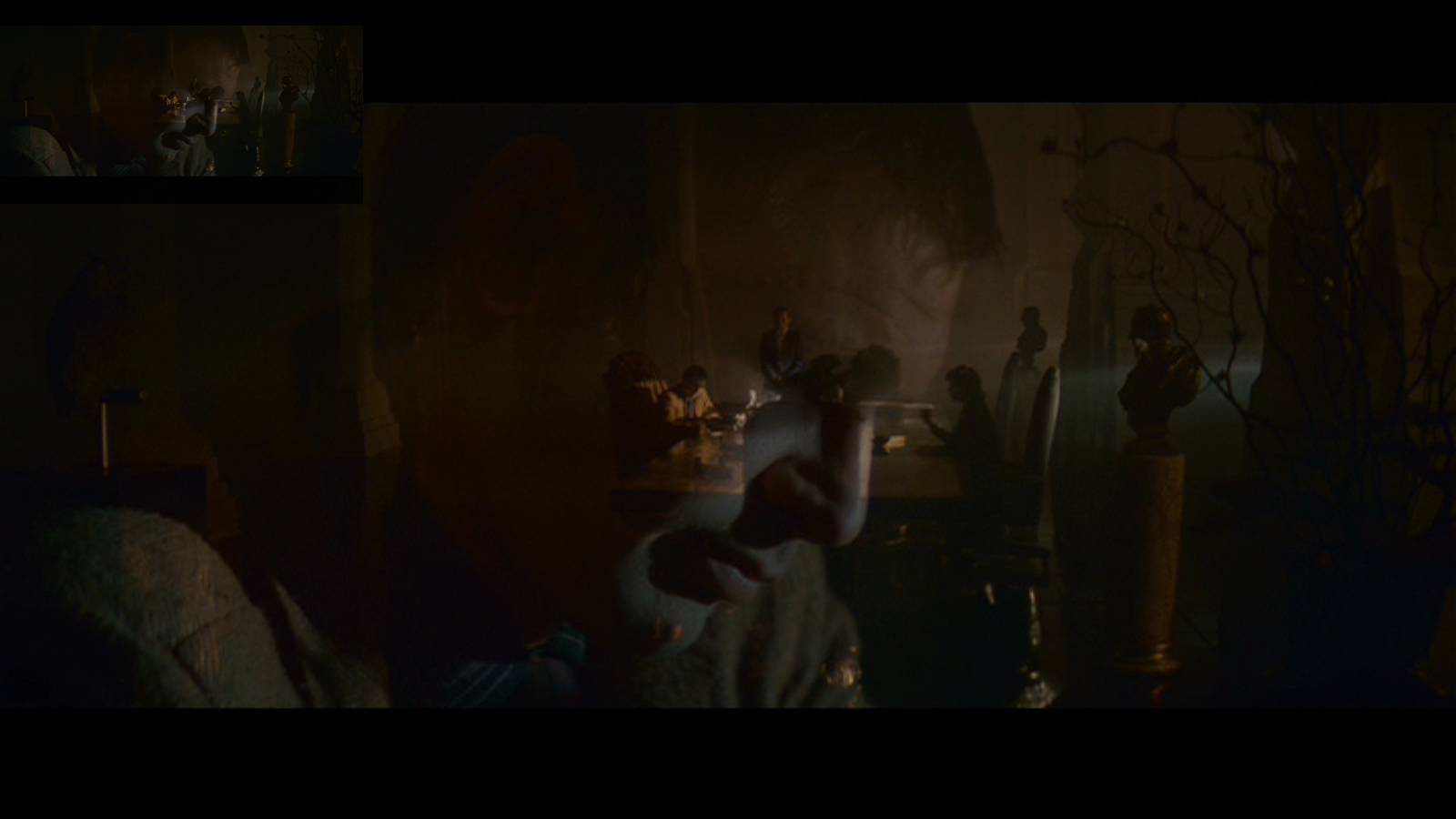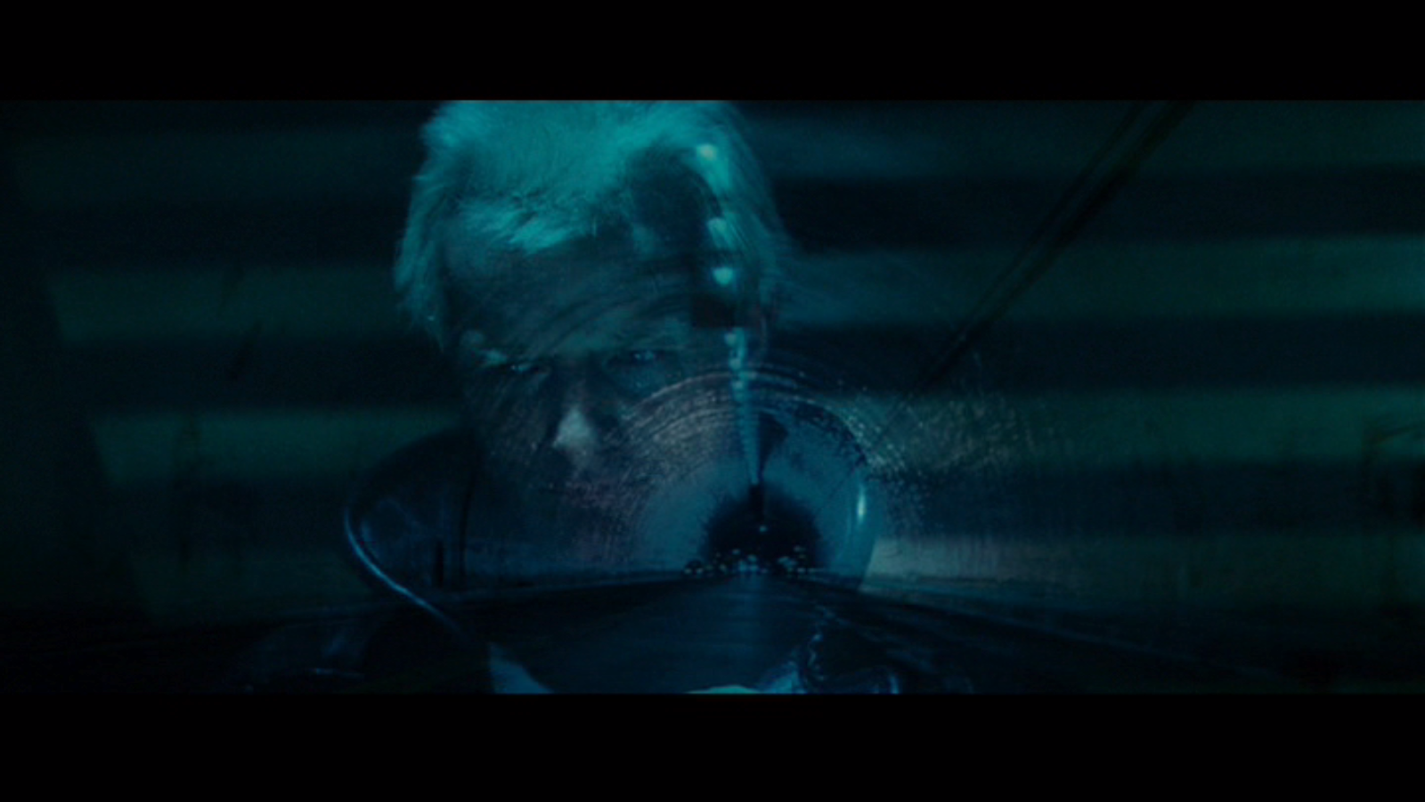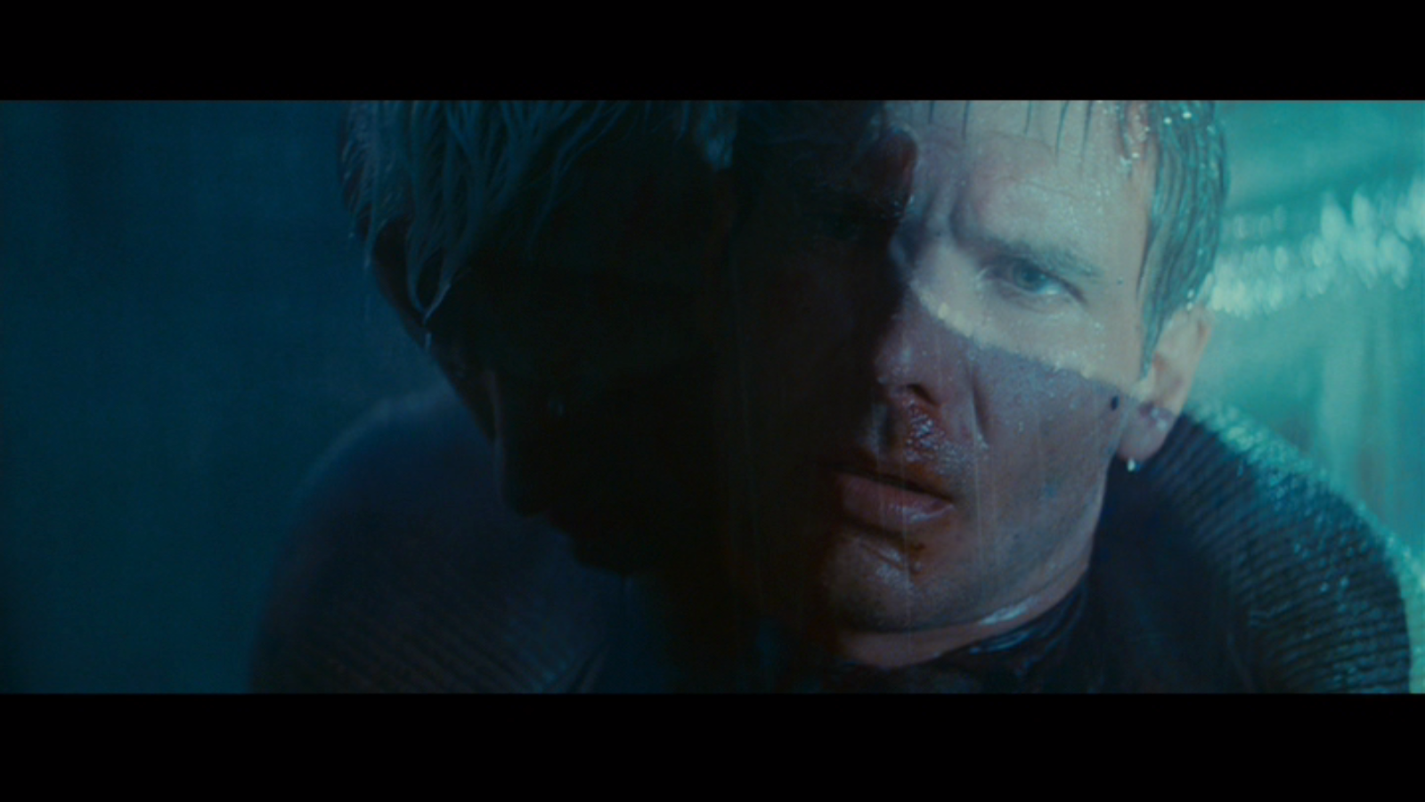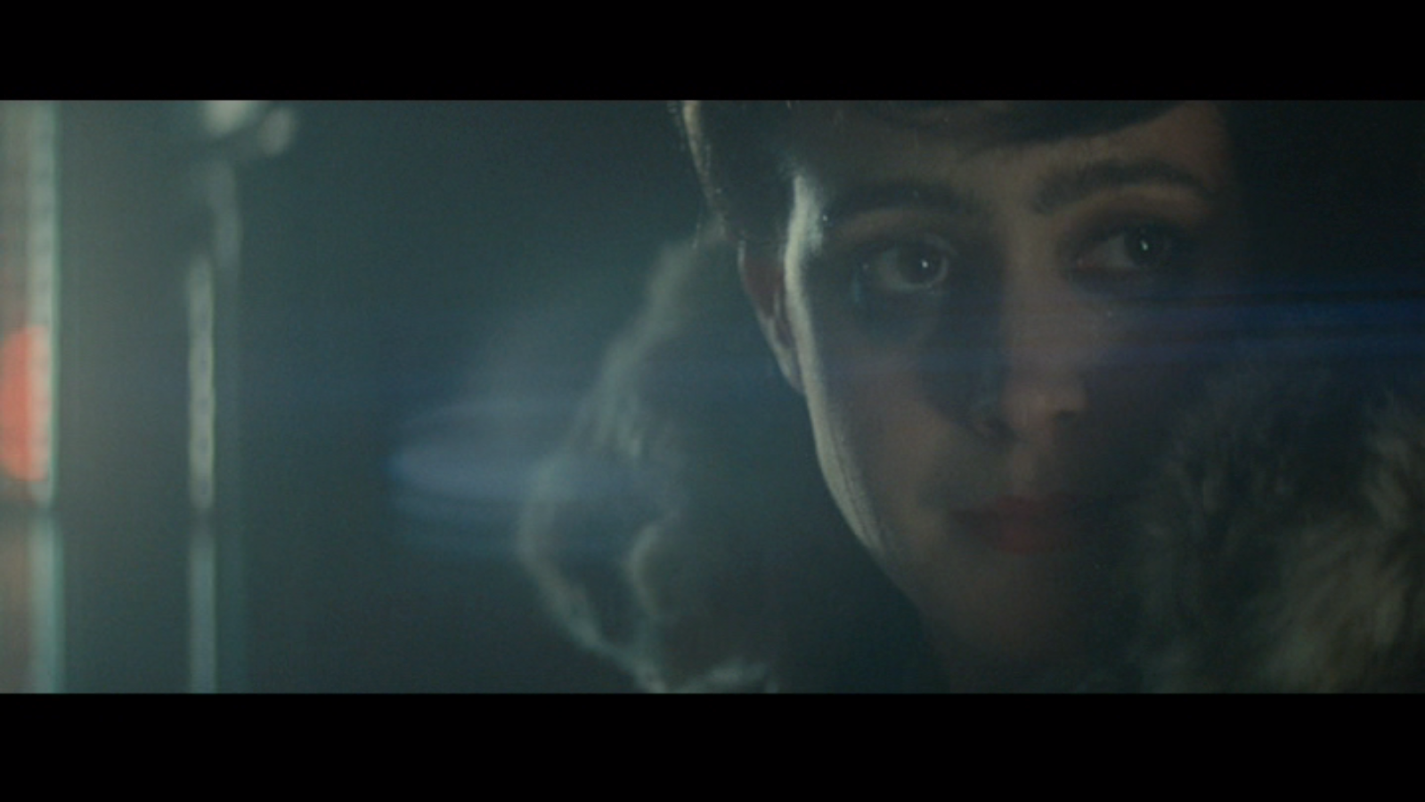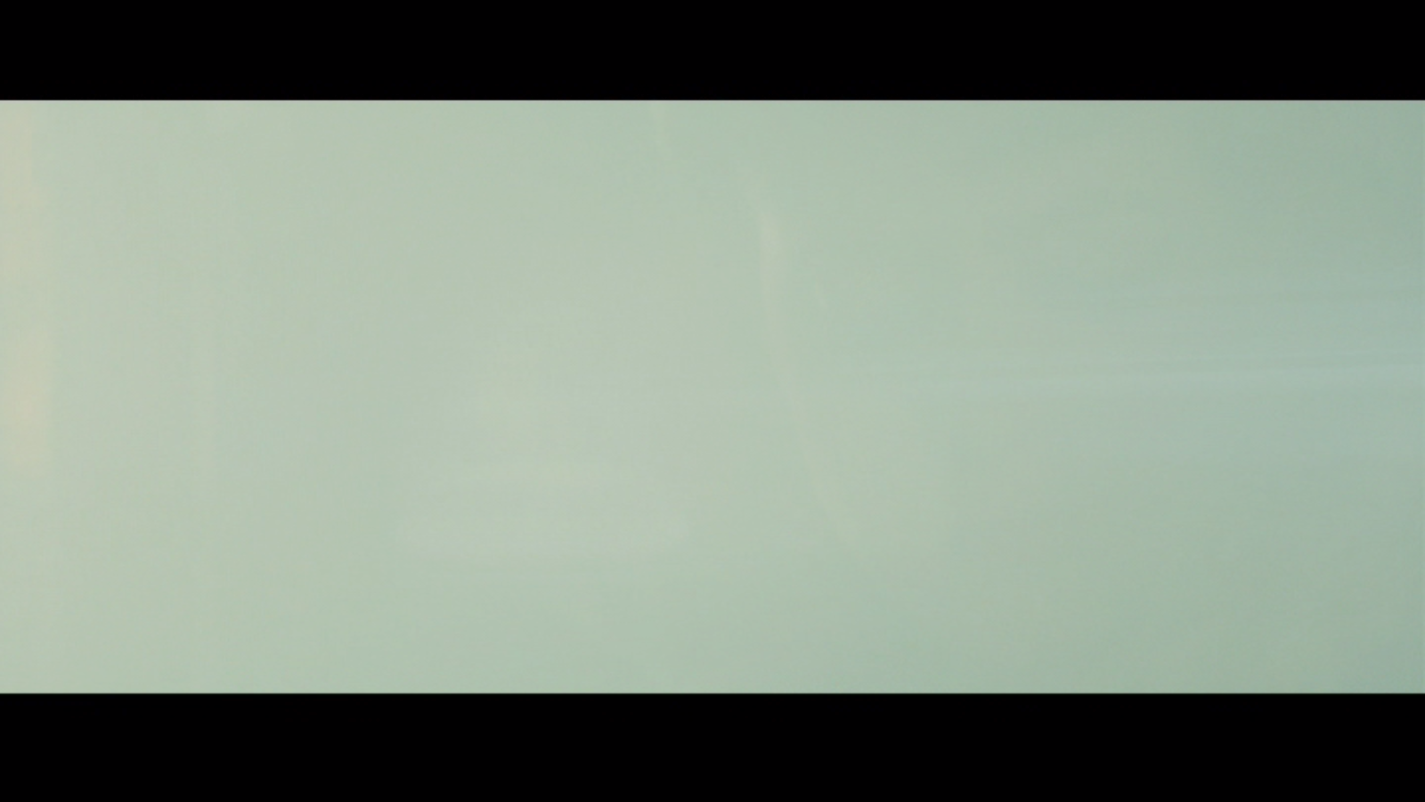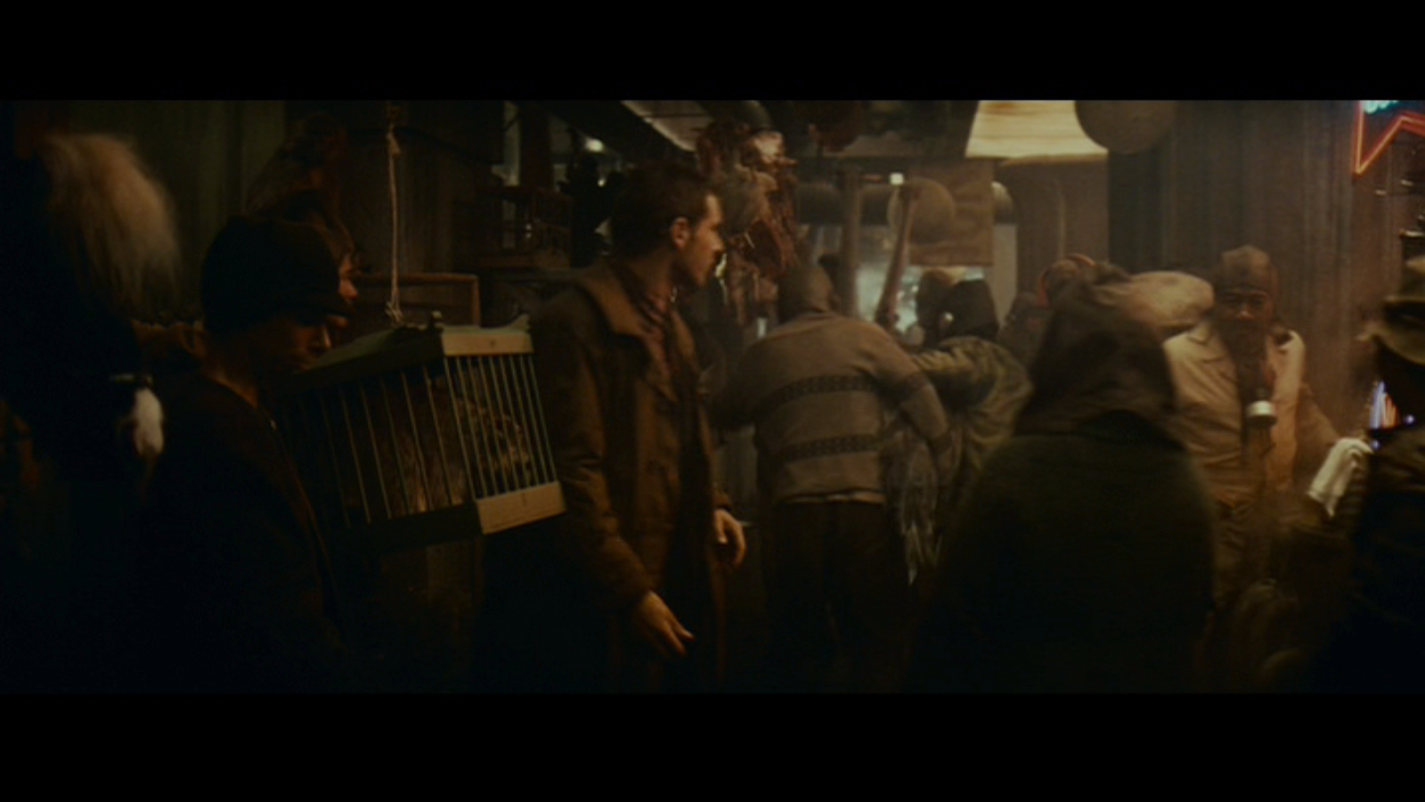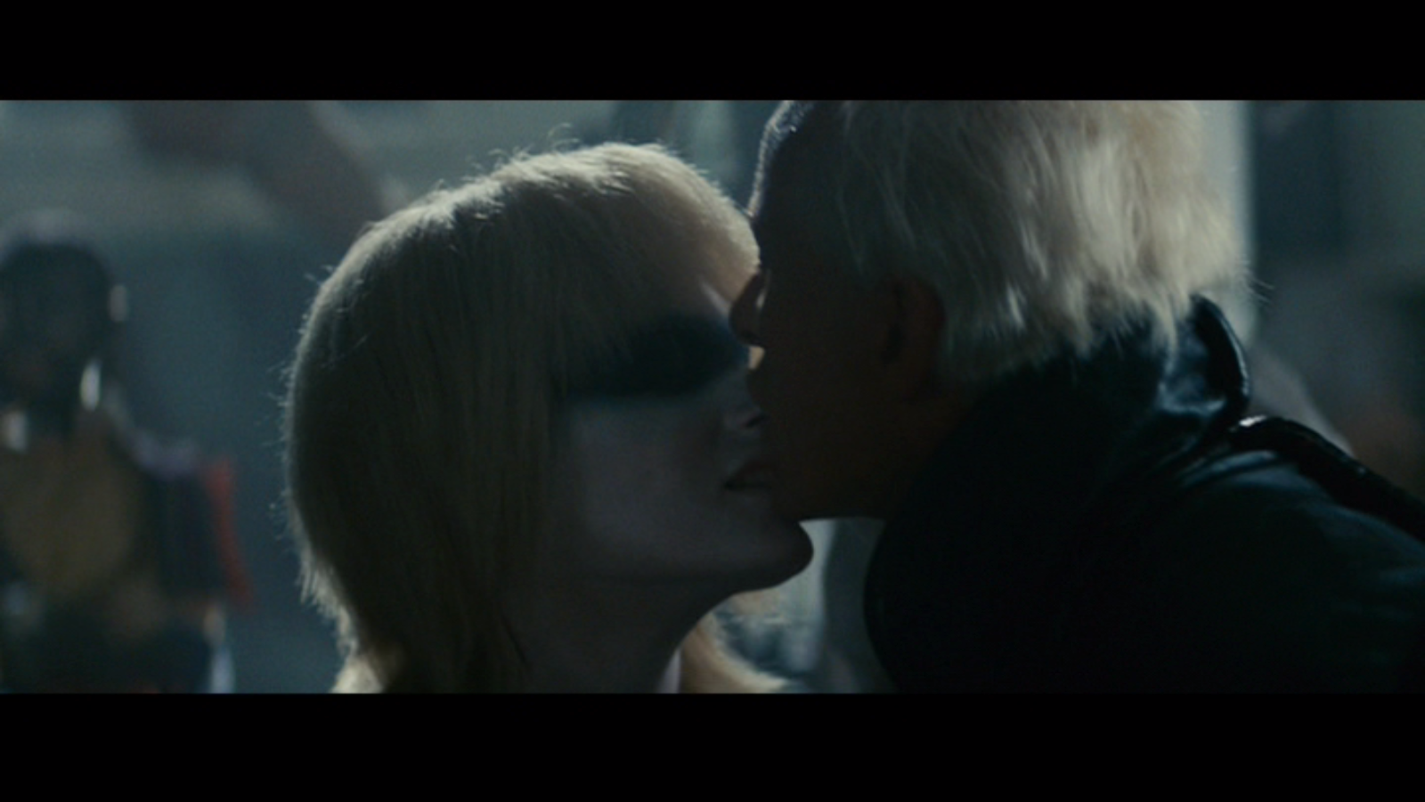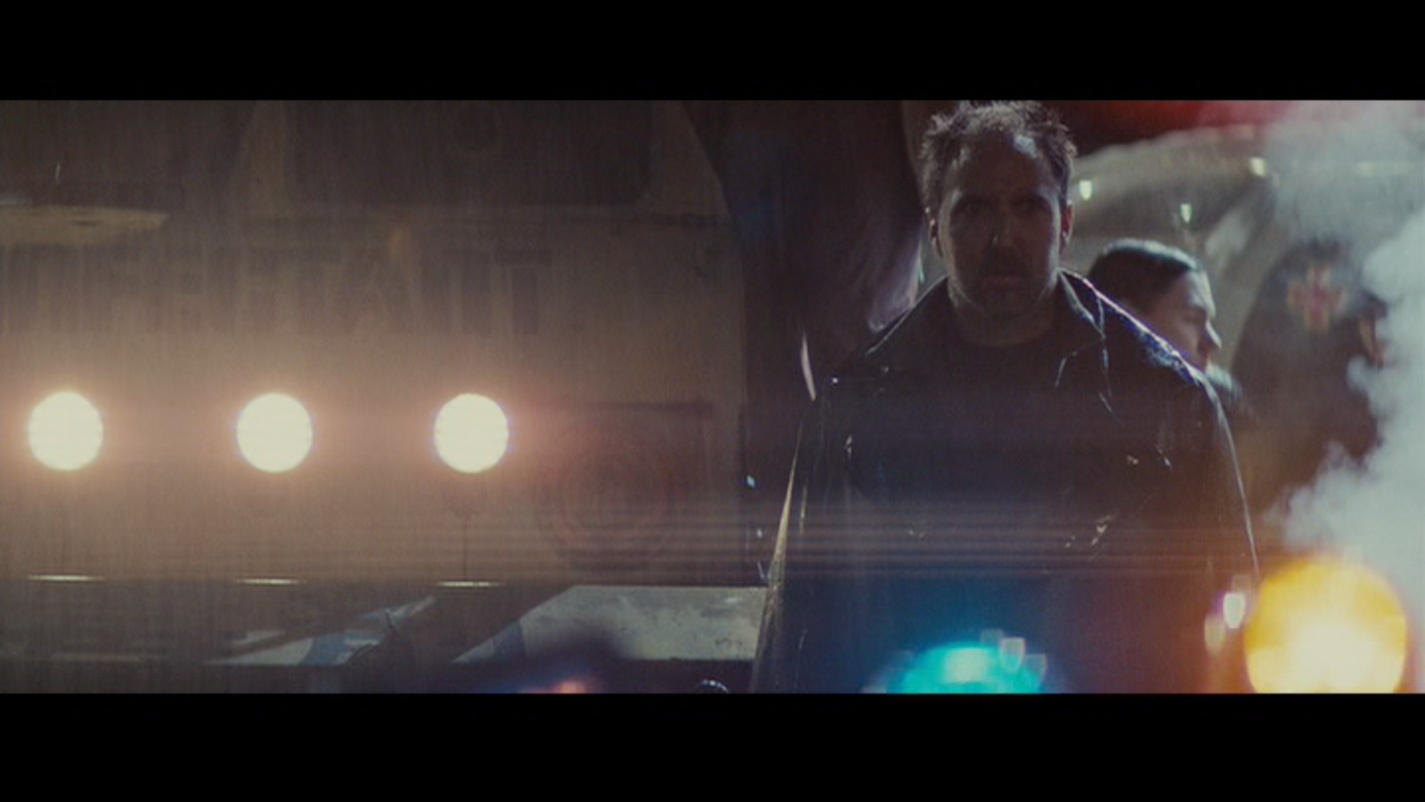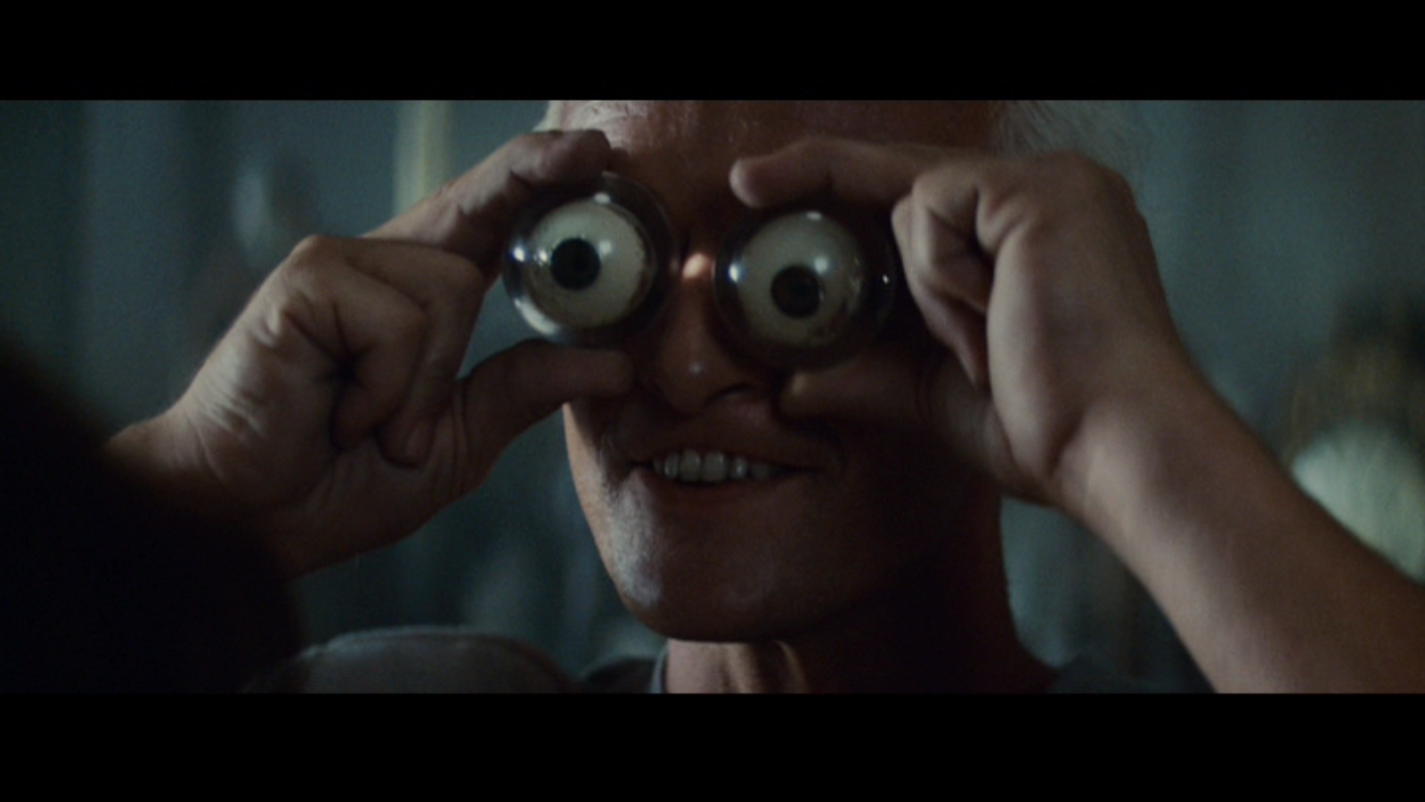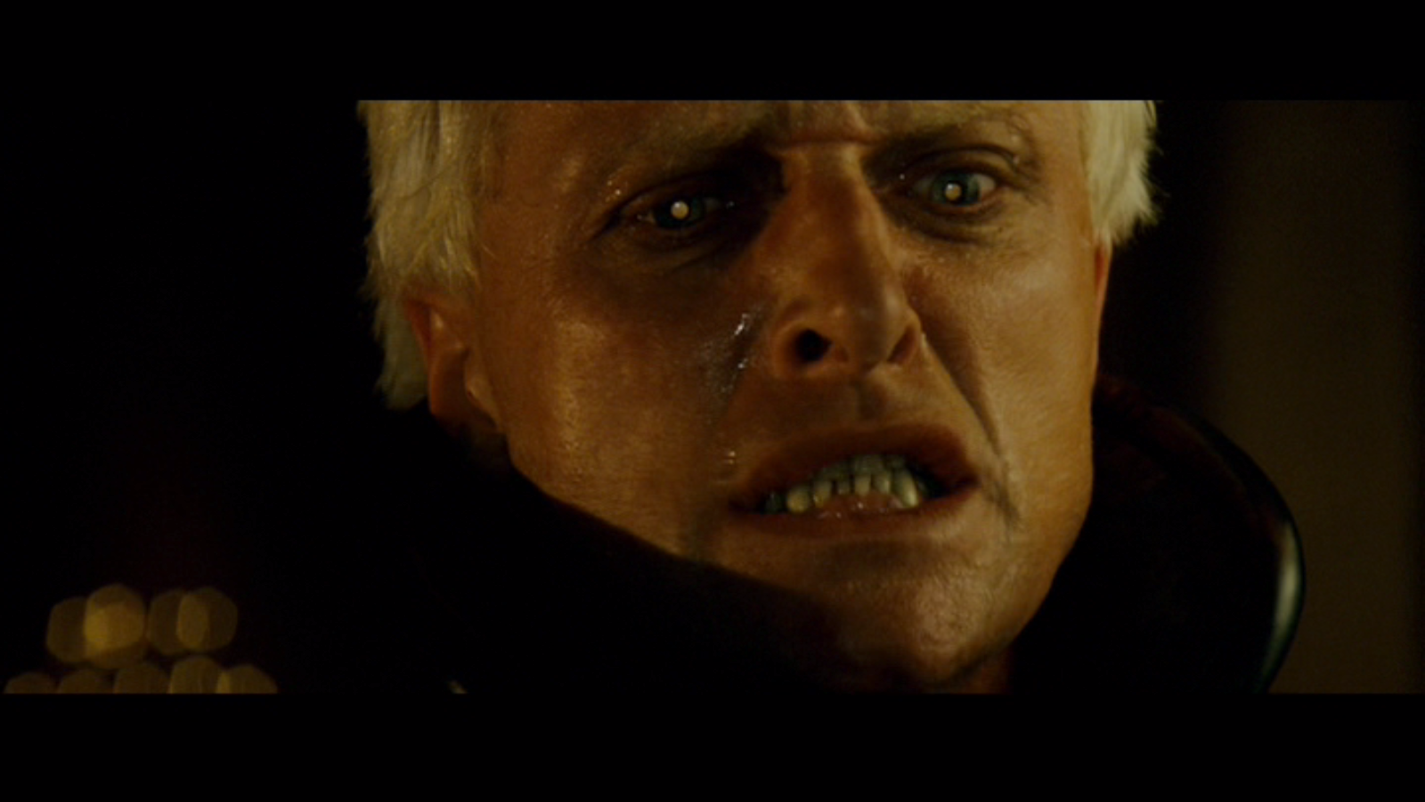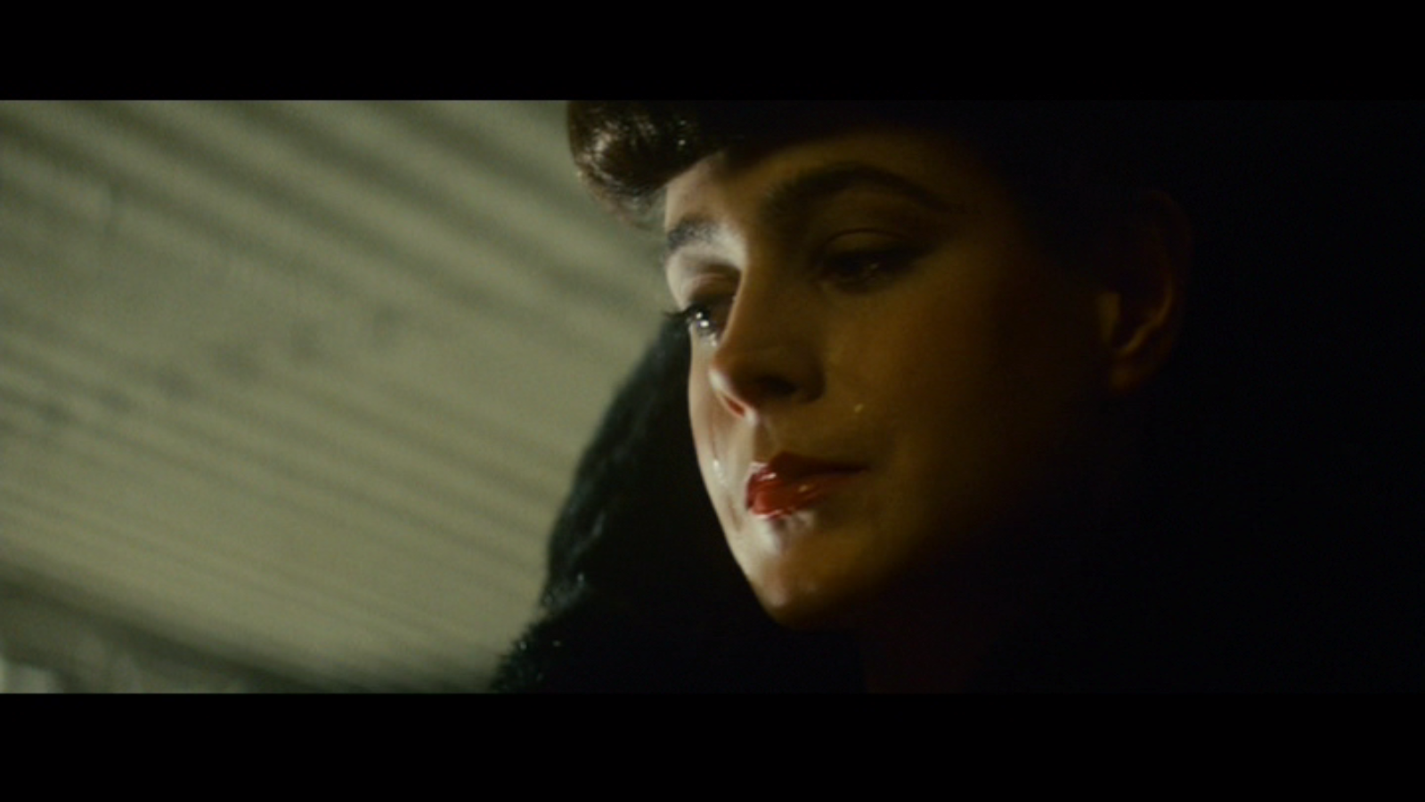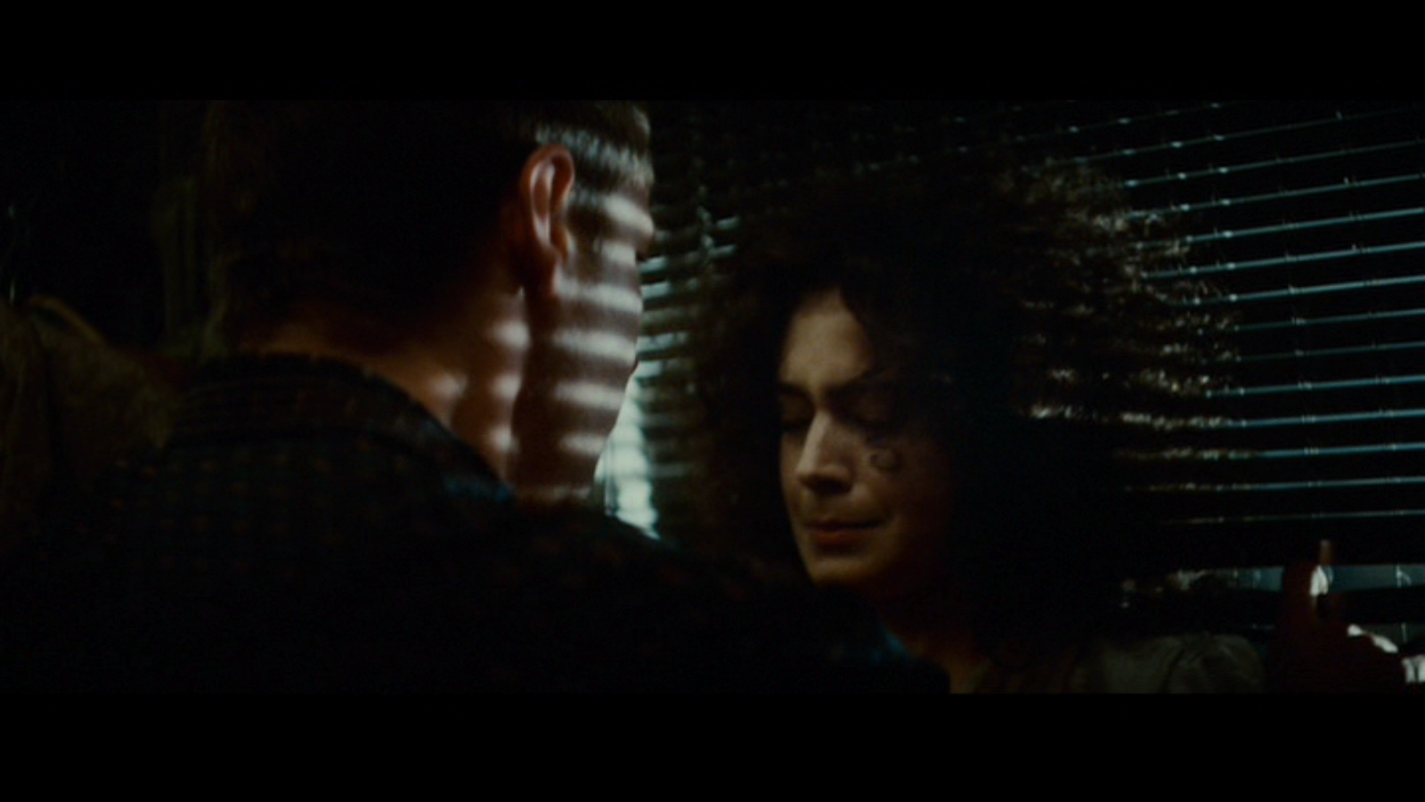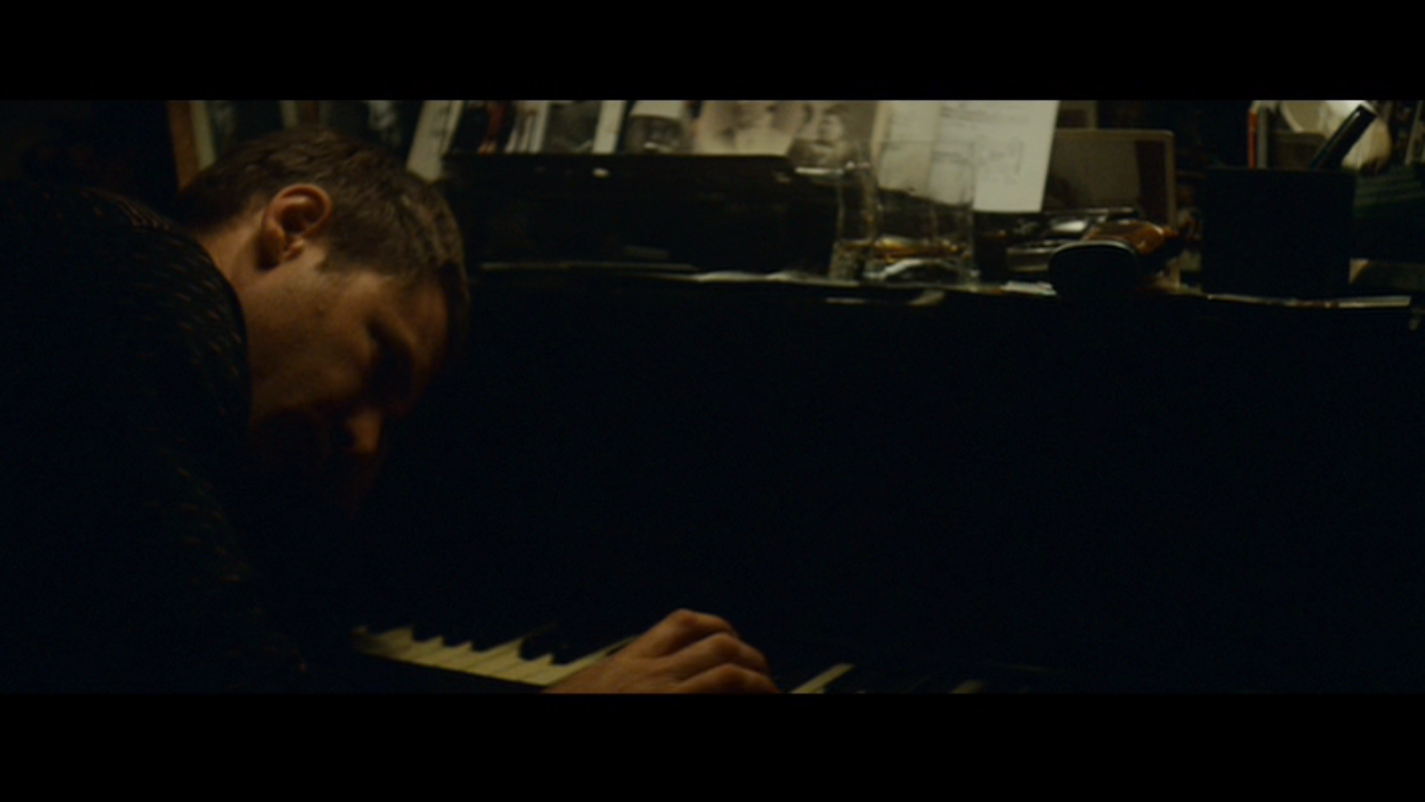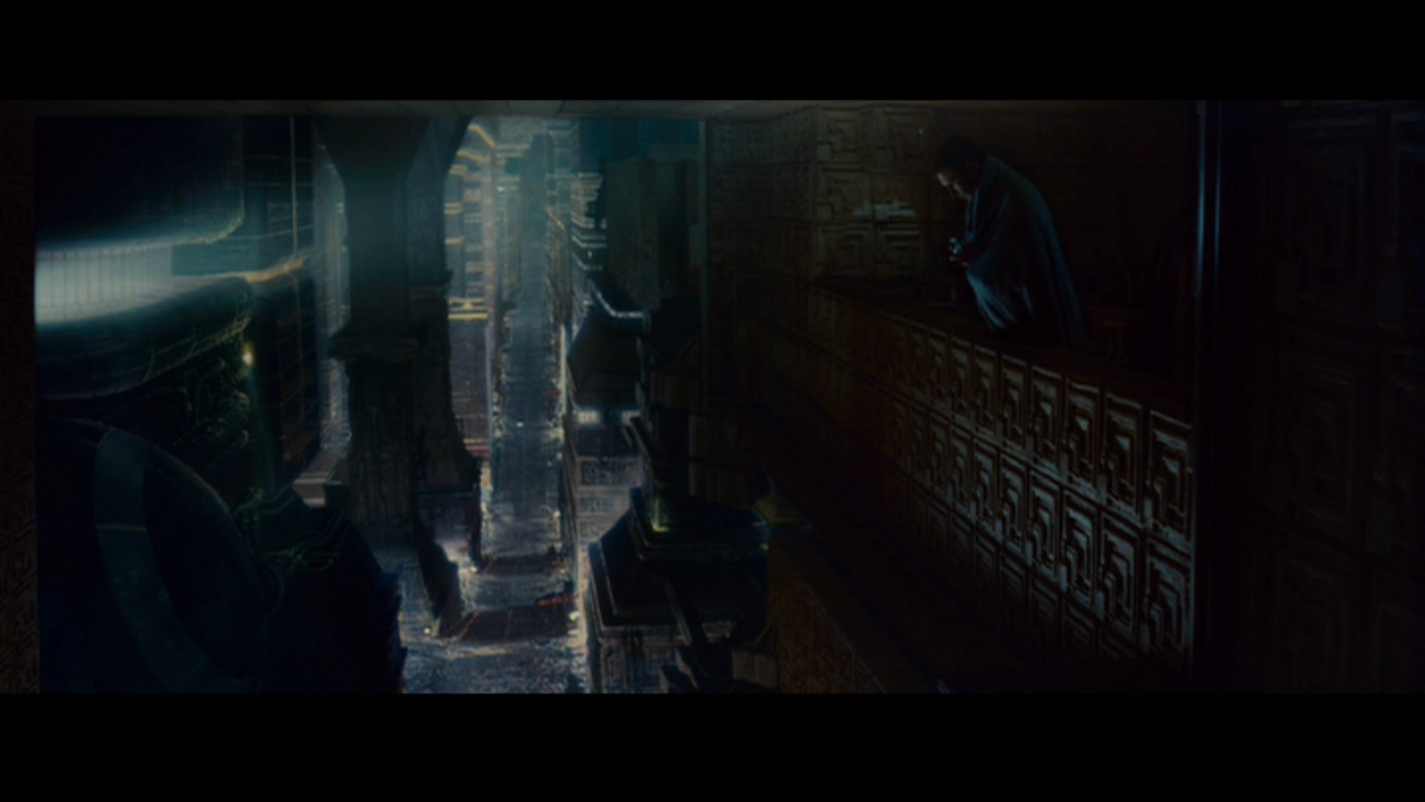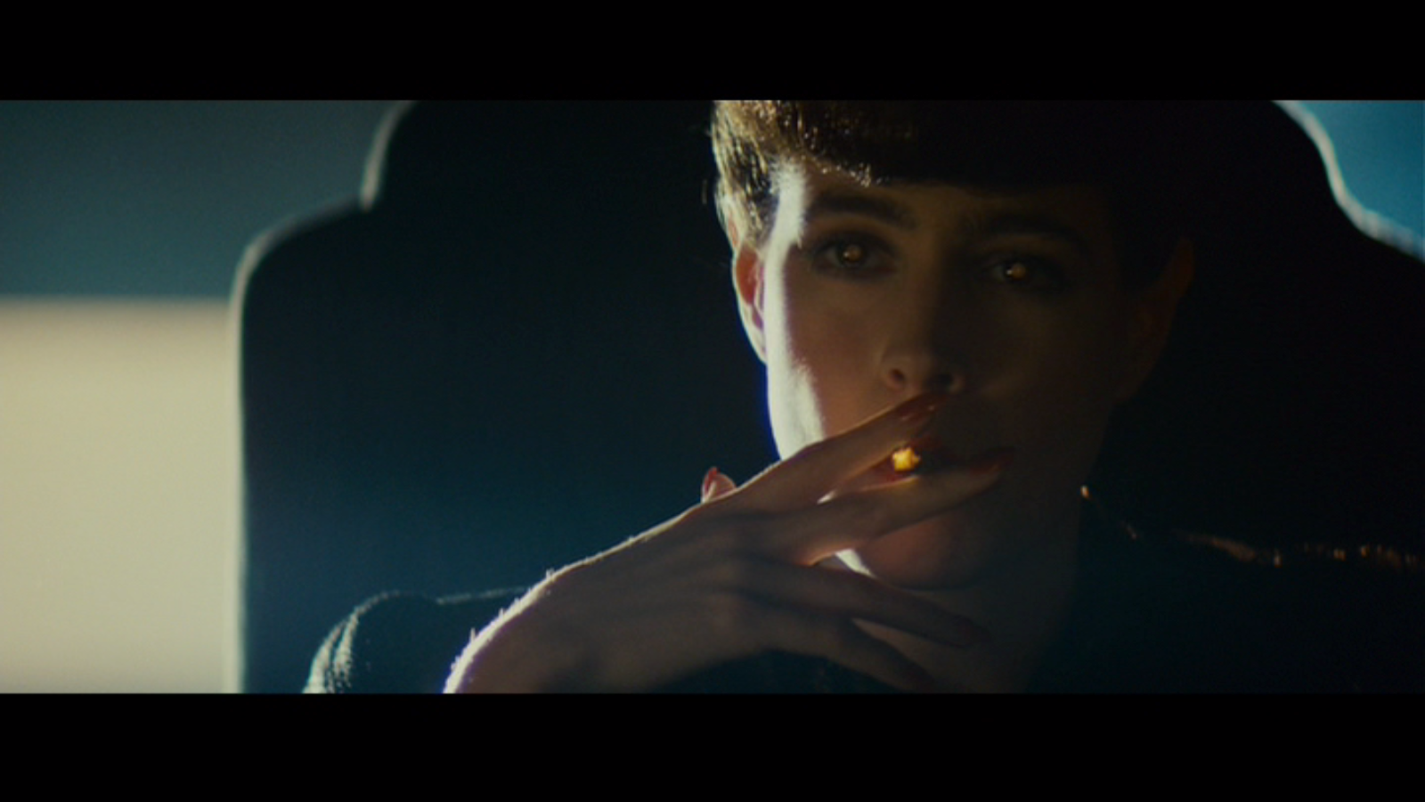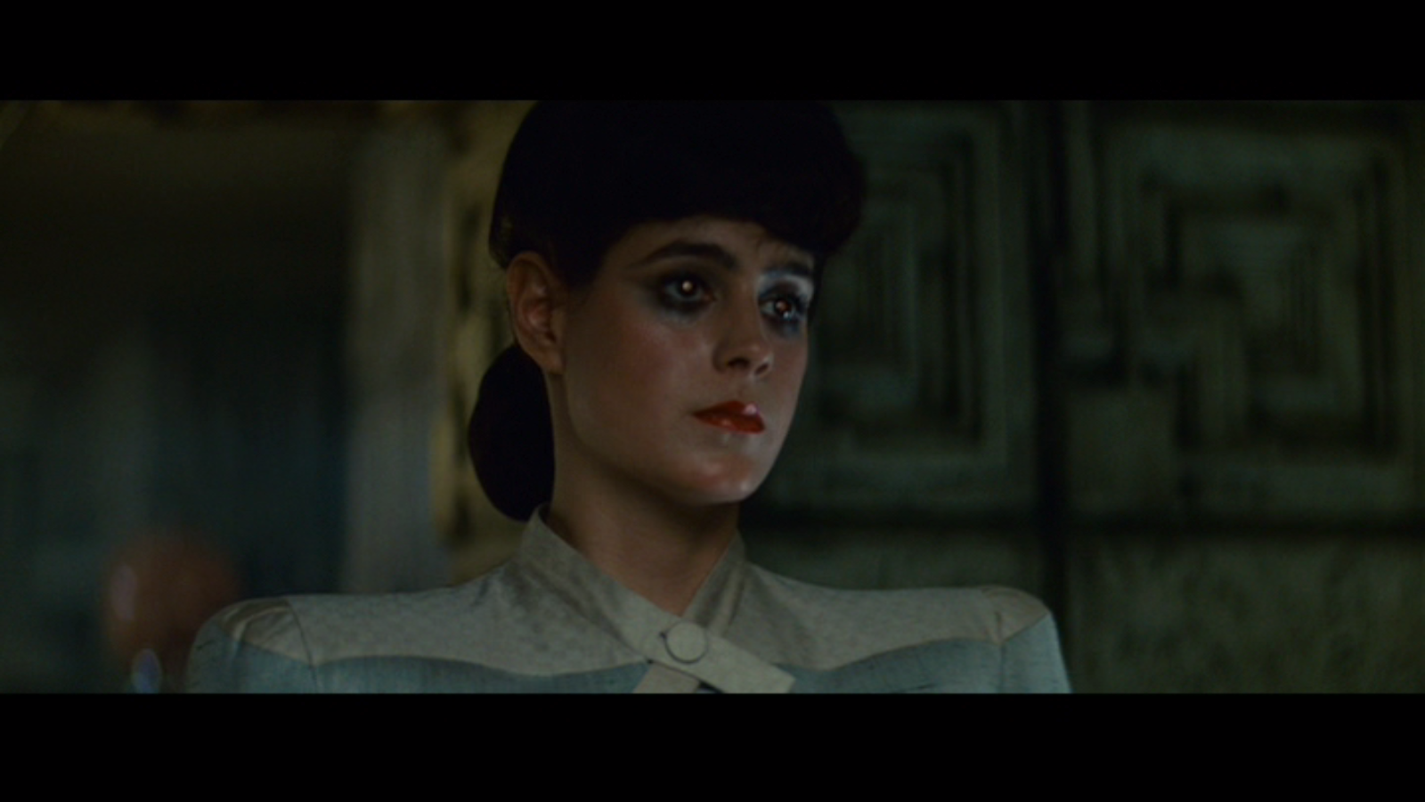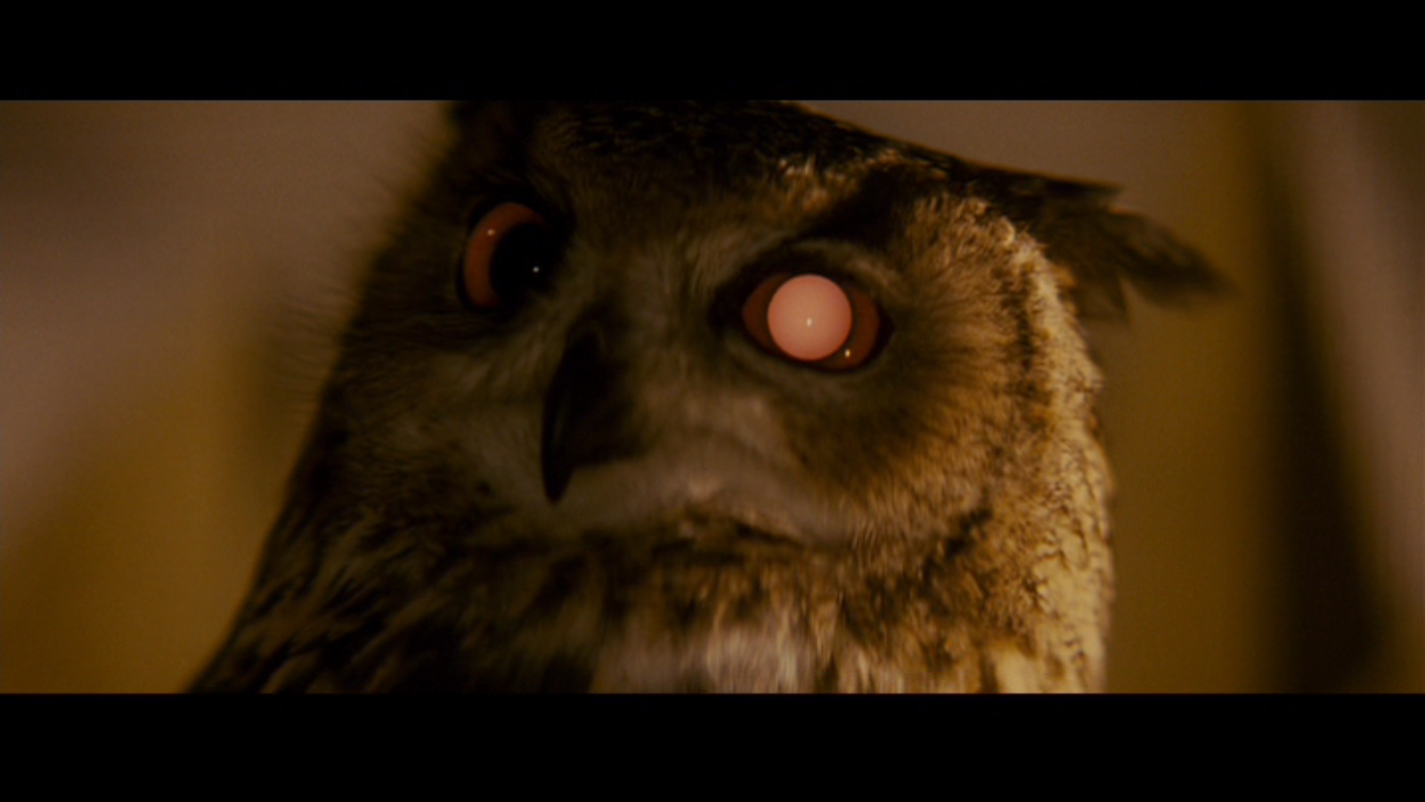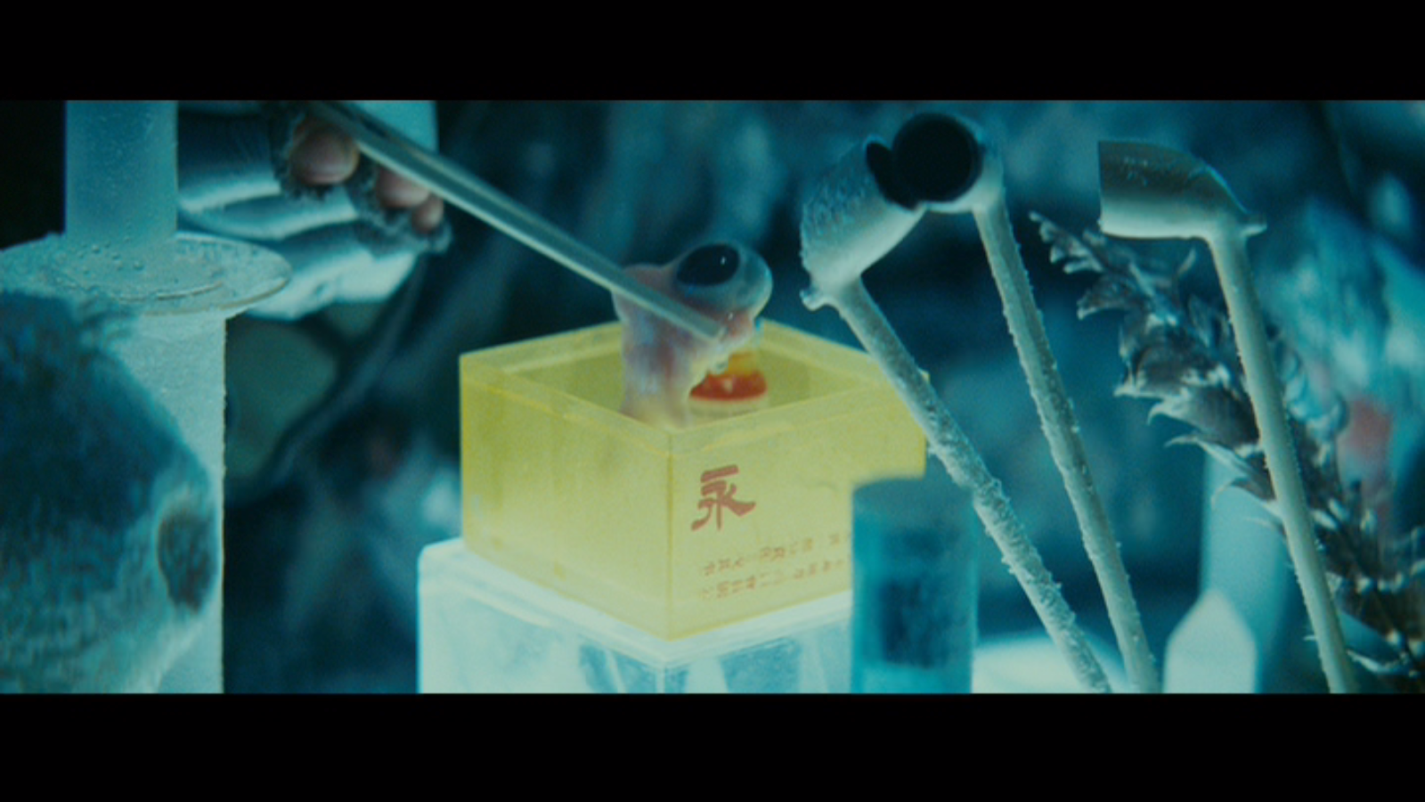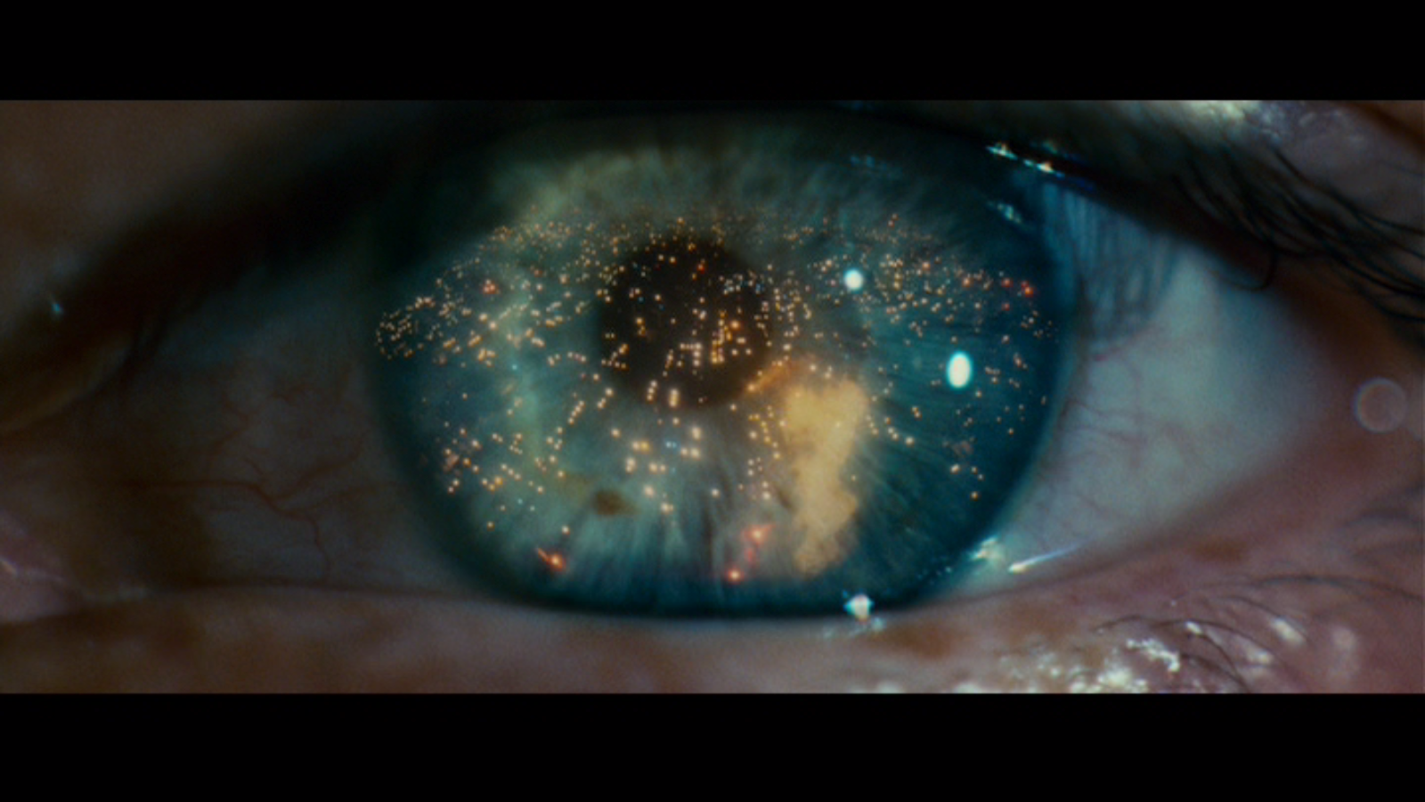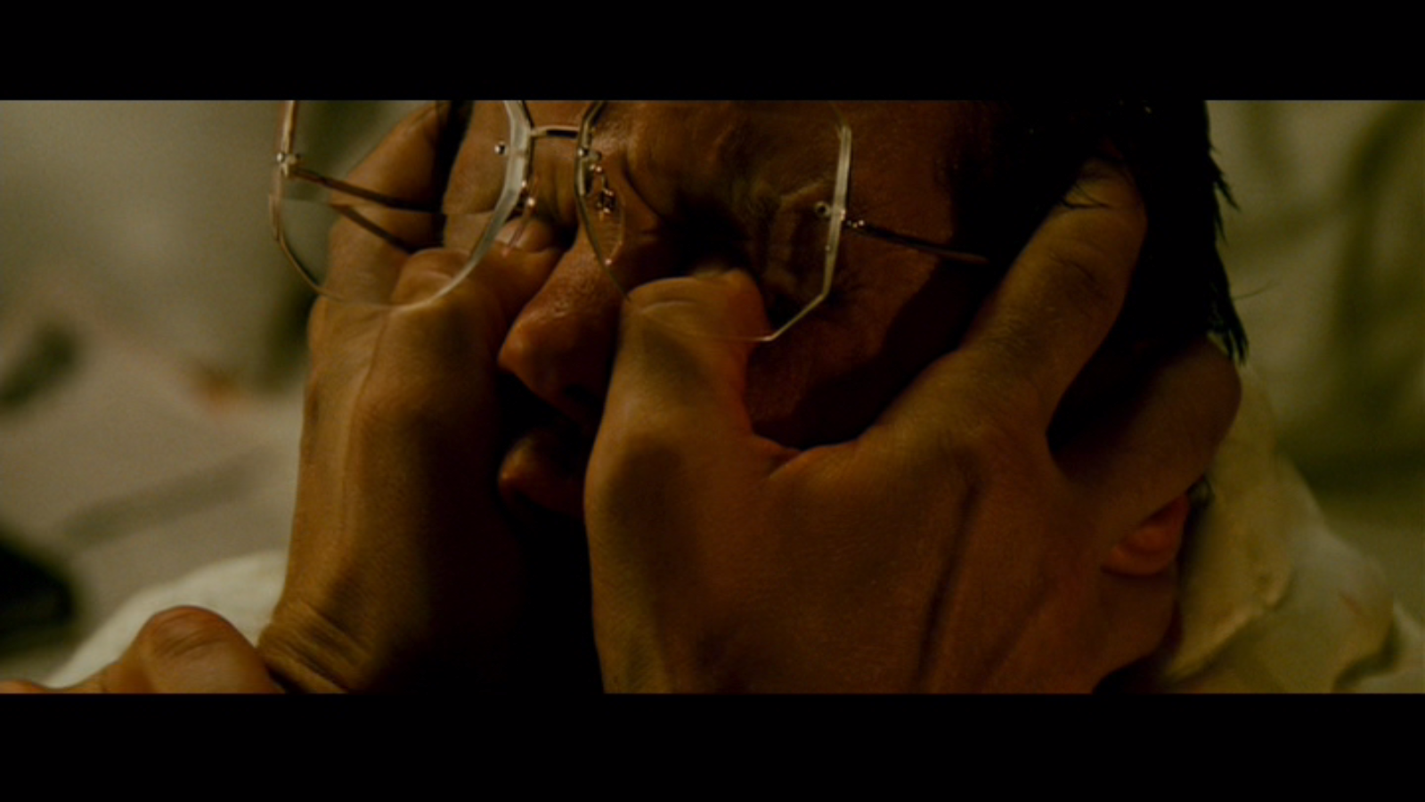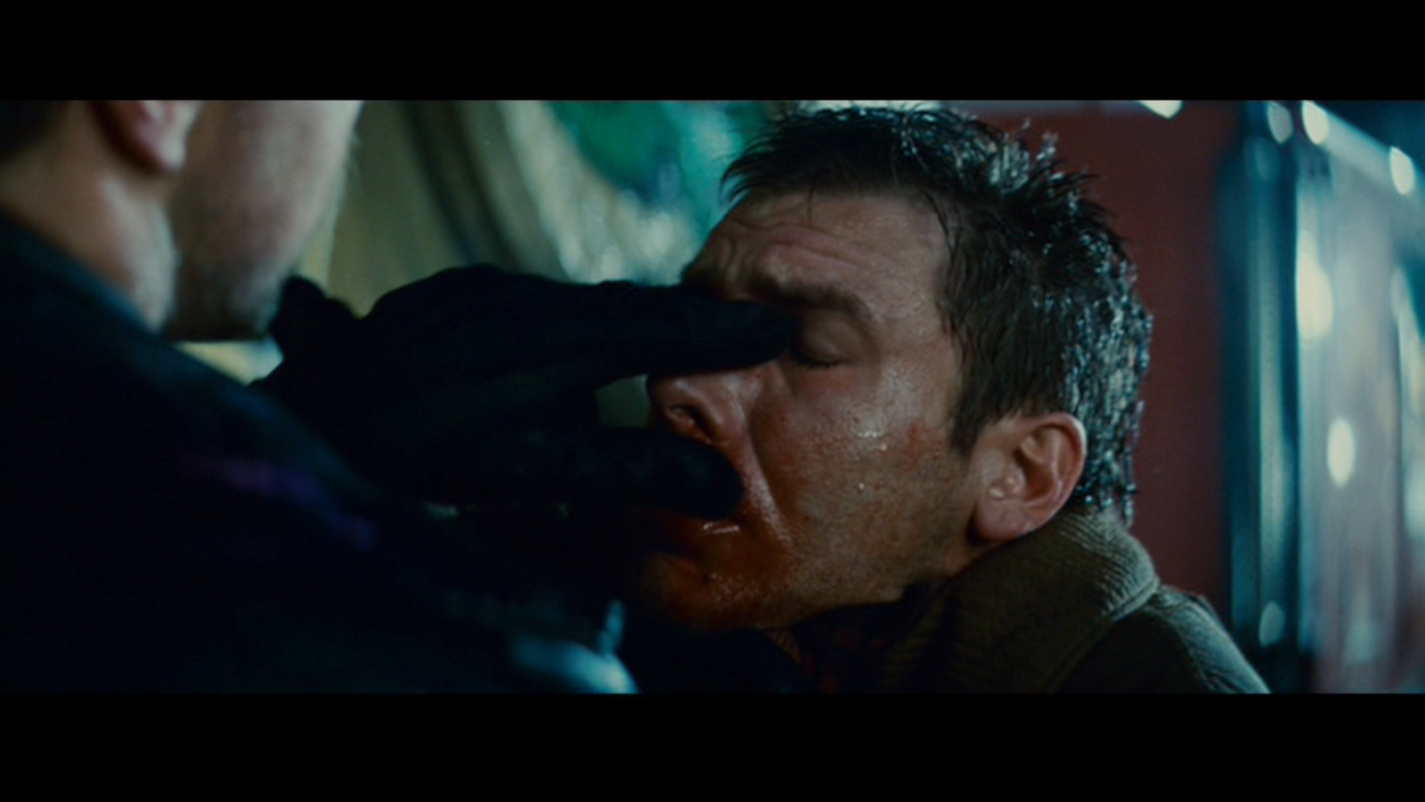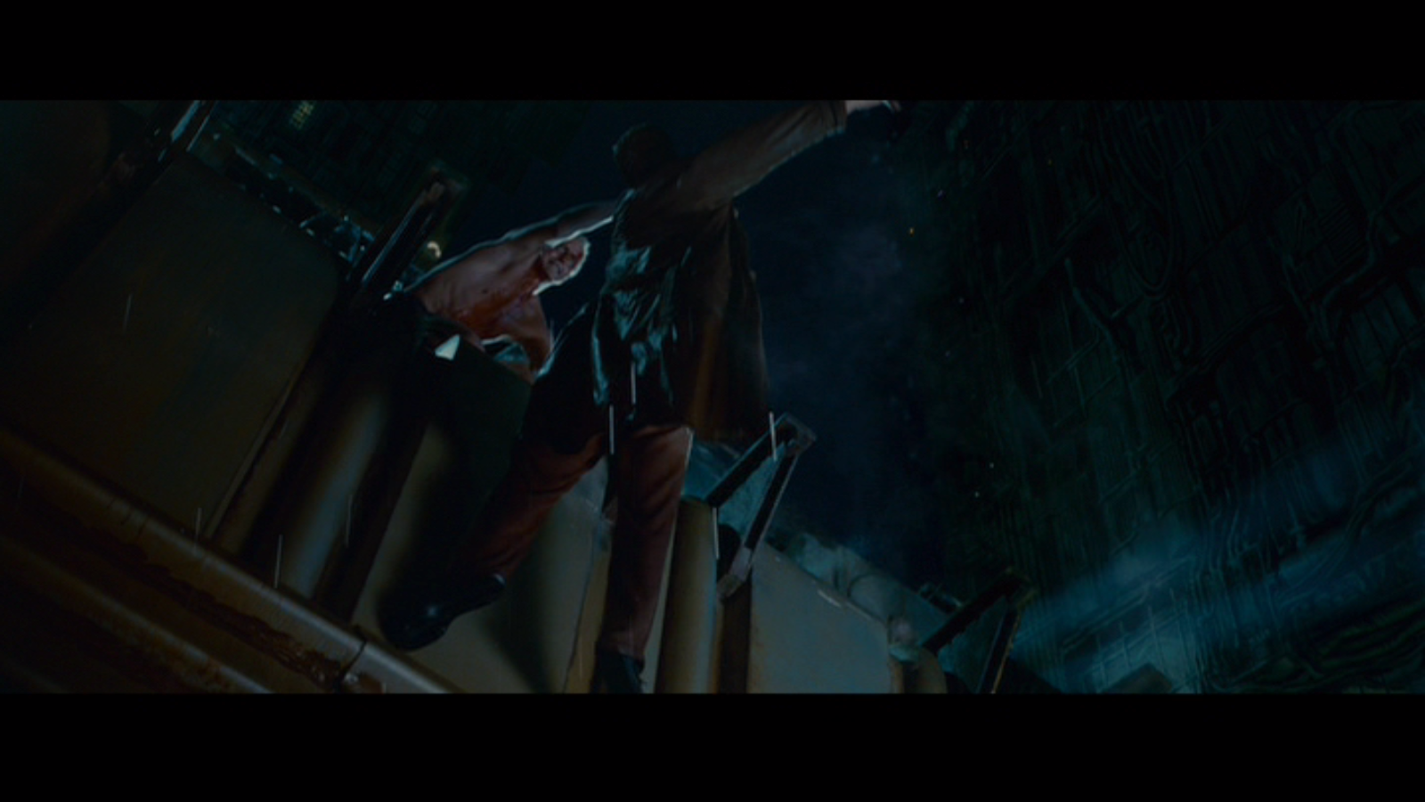We get a break from Jim J. Bullock this week, and let’s be honest: we’ve earned that. The Enter the Neal two-parter introduced further drag to a show that never had much energy to begin with, and every week I get less convinced that there are any diamonds left in the rough.
Maybe that was the purpose of bringing Jim J. Bullock onto the show, actually. By thrusting us deep into the worst possible version of ALF imaginable, they ensured that anything that followed would look good by comparison.
So, does it? We’ll find out now with our first post-Bullock episode, “Live and Let Die,” which begins with ALF exploding Weird Ed’s hamster in the microwave.
We’re back in low-quality video territory for this one, as you can probably tell from the murky screengrab. What baby did we all collectively kill to be punished with the fact that the only masters that look good are the ones starring Jim J. Bullock?
Willie comes in with bad news: he “found the cat” outside by the fence. Fortunately Kate recalls that it had a name, and asks if he means Lucky. I’m glad someone on this show finally remembered they had a cat. Of course, it’s a bit late, as Lucky is dead.
Well, let’s ac-cent-tchu-ate the positive: this is a great idea for a story. No, really, it is. We’re immediately carving out some room for emotion and minor drama, and the death of a pet is a nearly universal tragedy that just about every child experiences at least once. It’s fertile and appropriate territory for a family sitcom, and this could lead to some interesting — dare I say “watchable?” — things. I’m on board.
The suggestion that we might get a very human story this week is raised here, too, as Willie and Kate agree that Lucky’s death is going to be especially hard on Brian. I’m not sure why, since the kid hasn’t even seen the cat in two and a half seasons, but I’ll go along with it.
I don’t know what Willie means when he says he “found” the cat, though. Was Lucky lost?
He could just mean it in the sense that he “discovered” that the cat was dead, which is fine, but was Lucky an outdoor cat? He never seemed to be before. It’s weird.
Willie says that Lucky died peacefully in his sleep, which is what everyone says after they accidentally run something over with the lawnmower.
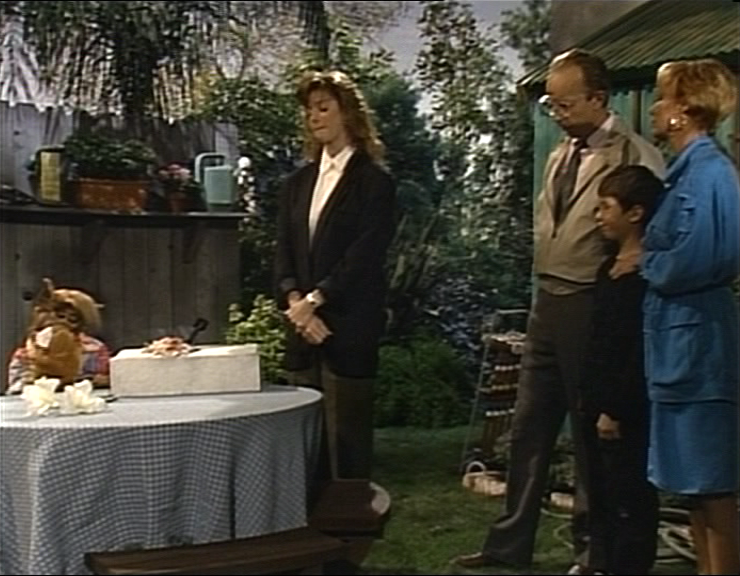
In the next scene, it’s the funeral already.
Wow, this episode is just rocketing along. Not that I’m complaining…but I am worried. When an episode opens with a death and a funeral in quick succession, that could be an indication of pacing problems (characters really should get to breathe a bit between those two things), or an indication that the episode has so much ground to cover that it can’t afford to linger.
I’m not passing judgment yet; I’m genuinely curious as to what the rest of the episode will entail. But I am worried, because this is ALF, and it’s not as though we’re really in capable hands. By now I know that my worry is usually for good reason.
For those curious, I’m indifferent about the fact that ALF is learning about death yet again. He bonded with a dying girl in “ALF’s Special Christmas,” murdered a kindly relative in “We’re So Sorry, Uncle Albert,” and cooked some ants in “Funeral for a Friend.” So, yeah, ALF-deals-with-death is admittedly not a new melody for this show to sing at us, but two of those episodes were garbage, and the third one — which I liked quite a bit — is a very different situation than the death of a pet that’s been on the show from the very first episode.
In short, yeah, ALF has dealt with death before…but only the deaths of characters we didn’t know. Now he’s dealing with the death of Lucky, a name we’re all familiar with, and it’s a death that impacts everybody in the family.
Do I have faith that it will be handled well?
Fuck no.
Am I interested to find out what happens?
Yes. I definitely am.
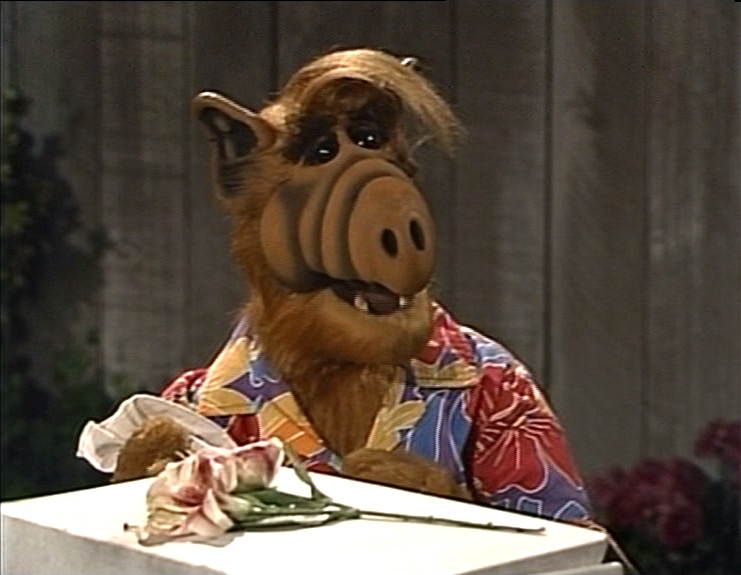
The family shares some little speeches about Lucky, and we see that ALF is wearing the same thing that I wear to funerals.
The suggestion that Brian would be hit hardest is…actually followed up on here. He’s asked if he’d like to say anything, and he says no. Kate tells him that it may help to say goodbye, so Brian says, “Bye.”
And…fuck. It’s actually decently affecting.
You know how Andrea Elson is naturally good at being warm, Max Wright is naturally good at being awkward, and Anne Schedeen is naturally good at wanting to castrate things that sound like Paul Fusco?
Well, here’s where Benji Gregory gets to be good, at last. His sad, detached demeanor works really well here. Brian’s not in tears, but he’s hurting. And, for once, the character’s stilted line readings suggest something that he might be feeling inside…an inability to get to grips with things.
It befits his sadness. For the first time, Benji Gregory’s style of acting (fuck me is that a generous thing to call it) makes sense for the character, and for the context.
Congratulations, ALF, you blind squirrel. You found a nut.
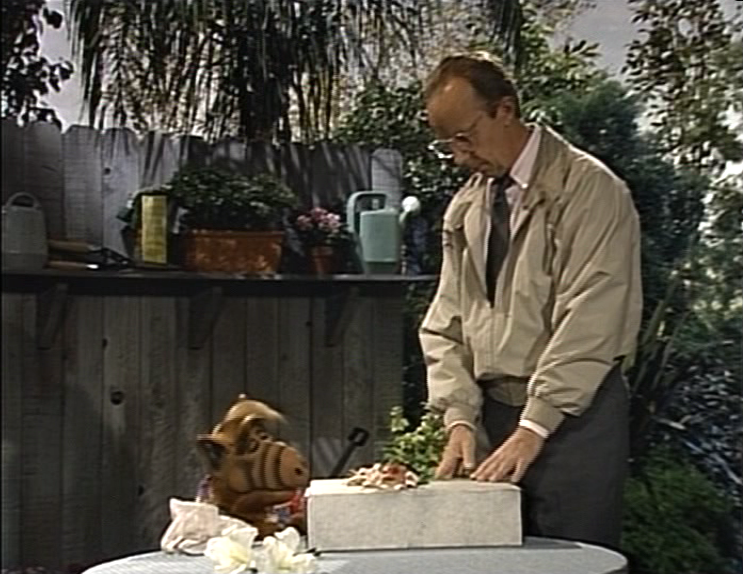
Everyone leaves so Willie can bury the cat, but ALF hangs around because he wants to eat it. This is ALF, where if you tell a joke once you might as well tell it fifteen million times.
Willie is pissed that ALF isn’t taking the death seriously and has no regard for anyone else’s emotions, which, in light of the fact that ALF has learned this precise lesson three times already and is in the middle of learning it a fourth, is a fair thing to be upset about. But ALF does have a point to make specific to this circumstance: on his planet, this would be like having a funeral for a hamburger.
And this could be an interesting thing to explore. After all, even just on Earth we have cultures that value the lives of some species more than others, and the value isn’t uniform. That probably sounds shitty, but I don’t mean it to be. If I heard that somebody’s pet snake died, or if I found a dead snake in the road, I wouldn’t think anything of it. In India, however, they are celebrated and worshiped as earthly links to the deities. They’d have a very different reaction to the death than I would. Conversely, if I hear that somebody’s dog has died I fall directly on the floor and sob for months…but go to Korea and dog meat is food. Massive difference, and it’s not due to us coming from different solar systems; it’s due to us simply being born a few thousand miles apart.
That dog example is an apt one, considering ALF’s “hamburger” comparison. For him, it’s absurd that somebody would get attached to an animal that he’s always seen as cattle. For someone who treats that animal as part of the family, though, it’s just as absurd that anyone would think of it as cattle.
There’s a dichotomy there that this show is in a unique position to explore; Melmacian culture doesn’t exist (I’m speaking about our reality here, but, come to think of it, it doesn’t exist in the show anymore, either), which means ALF can use it as a convenient filter through which to discuss the inequality of value we place on life as humans, rather than as Americans, Indians, Koreans, or anything else. It doesn’t have to worry about falling into the trap of elevating one culture’s perspective above another, since the only other culture we’re comparing things to is fictional.
This is a really great opportunity to explore a fascinating point.
You’ve read enough of these reviews to know that that doesn’t happen, though, and I’ve written enough of them that my hopes were never up in the first place.
But I do find it interesting that this show stumbled onto a golden opportunity for social commentary by virtue of its longest-running, shittiest gag. It’s fascinating to me that it even came close to saying something with it, no matter how badly it bungled the execution.
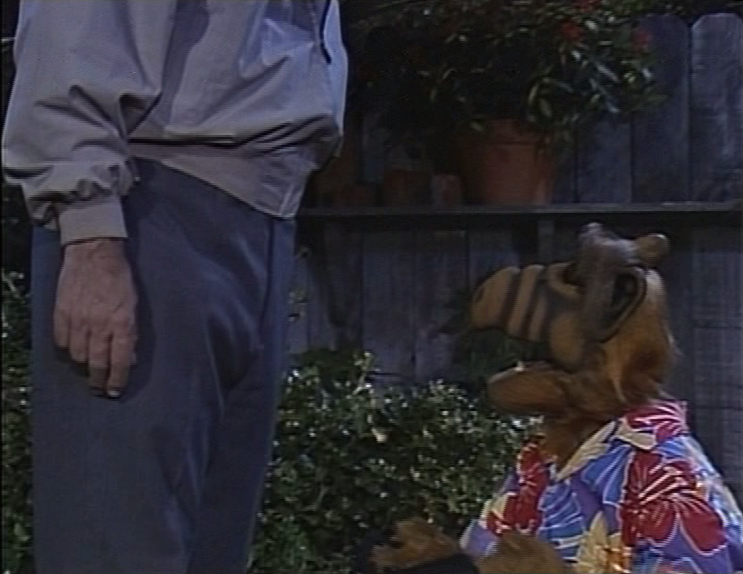
Later ALF is Looking for Lucky[‘s corpse] with a metal detector, and Willie catches him. But there’s something really odd about the height difference in this shot.
ALF isn’t usually that short. Is he? No joke, when ALF bumped into him like this I thought for a moment he was discovering Willie’s corpse hanging from a tree.
Comparing the relative heights of the characters to the previous scene, I guess this is about right…but man does it look off here for some reason. I honestly did think this was a dream sequence in which Willie had been hung by the neck until dead.
No such luck, though.
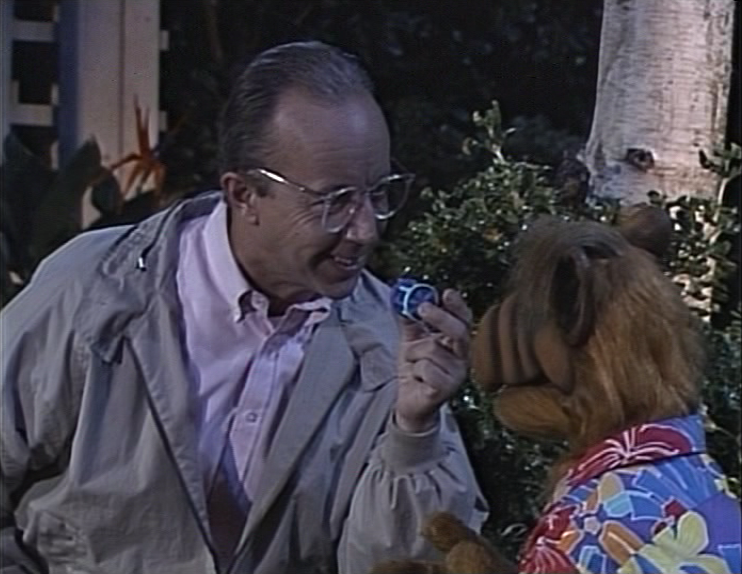
Willie scolds him for trying to eat the dead cat. He holds up the bell ALF put in the box in order to help him find the body, but ALF says that Willie’s mistaken; he’s just looking for quarters.
“Yeah,” Willie says. “Hind-quarters.”
And whatever the last thing I ate was, I guess that’ll always be the last thing I ate.
Mr. Ochmonek shouts to them like he’s coming over, and ALF hides, but then the scene ends and suddenly it’s the next morning.
Jesus Christ, does this show hate me so much now that it gets my hopes up for a Mr. O appearance only to dash them?
I wasn’t expecting him or anything. I was perfectly content to get through the episode without thinking I’d see my good friend / doughy Hawaiian-shirt model Mr. Ochmonek at all.
You fuckers made me get excited, just so you could disappoint me. That’s low, ALF.
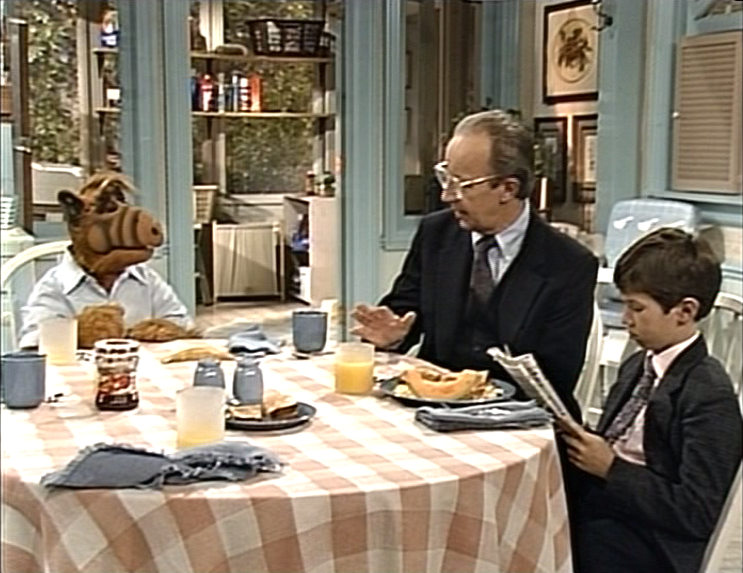
The family is getting ready for church, which once again raises the issue of how somebody’s faith in the Christian God might be threatened — or at least forced to adapt — when faced with incontrovertible proof of intelligent life in a vast, unknowable universe, but you’ve read enough of these reviews to know that that shit never happens, either.
Brian mopes a bit more than usual and says he’s not hungry. Kate tells him it’s not right to waste food, and ALF suggests burying it in the back yard, which would be funny if he didn’t then explain the joke (IT IS SIMILAR TO WHAT THEY DID TO LUCKY, WHO IS FOOD TO ALF) to his audience of fake, dead, braying, complete idiots.
Willie suggests getting another pet, and shows Brian the free animal listings in the paper. Then they all go to church, leaving ALF with those listings so he can order a shit-ton of cats, proving that the Tanners are complete idiots, too.
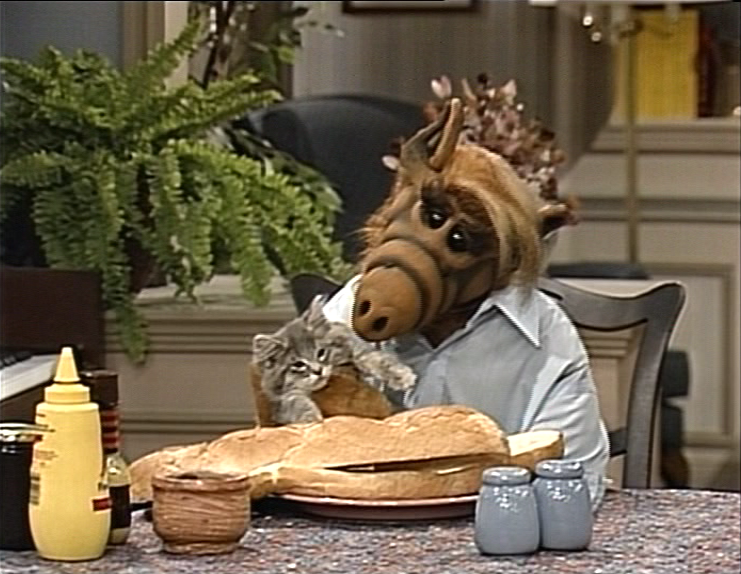
In the next scene, ALF indeed has a shit-ton of cats, so I guess he found someone in the paper who’d be willing to drop off a litter without meeting or seeing anyone there to accept it. That’s exactly one ethical notch above stuffing them in a sack that you’ll “accidentally” drop into the river.
ALF tries to eat the cat, but can’t, because it’s too cute. Then he tries to eat another one, but the Tanners come home before he gets to do it.
ALF eating a fucking cat is definitely this show’s long-delayed orgasm. And here we are, on the brink of it potentially happening…
…and it doesn’t really feel like anything at all.
I’d wonder why that is, but I think it’s because nobody actually wants to see ALF eat a cat. It’s a contract made with the audience on day one that we never actually wanted to see fulfilled anyway.
Do we? Are we, in the audience, rubbing our hands at the prospect of this space monster devouring a screaming kitten on TV? Of course not.
ALF wants to eat the cat, but we’re not on his side. This isn’t “Will Sam and Diane get together?” because we don’t especially want to see it happen. We’re not invested in the outcome the way ALF is.
If anything, our interest can only come from the other side: would ALF dare to show us a cat being eaten?
The answer is a pretty obvious no. Maybe some kids back then would have wondered if we’d see ALF eat one, but it would have been clear to any older viewer that no prime-time sitcom in the late 80s was going to show its title character biting the head off of somebody’s adorable pet.
Admittedly, shows today such as South Park, It’s Always Sunny in Philadelphia, and the exquisitely cruel Peep Show would be able to pull this off. “Would they actually do this?” is a question fans of those shows ask silently, week after week, and, often, yes, they do exactly what you’re dreading. There’s a kind of tension built between those programs and the audience…a promise that the audience only partially wants the shows to make good on.
But that’s a relatively recent development in sitcom writing, and it’s only possible due to comparatively lax censorship and broadcast standards. In this case, though, we’re watching ALF, a product of a much earlier, much more wholesome television climate.
(Let’s all just ignore the Too Close to Comfort episode about Jim J. Bullock being hilariously raped. Like, seriously. Let’s ignore it forever.)
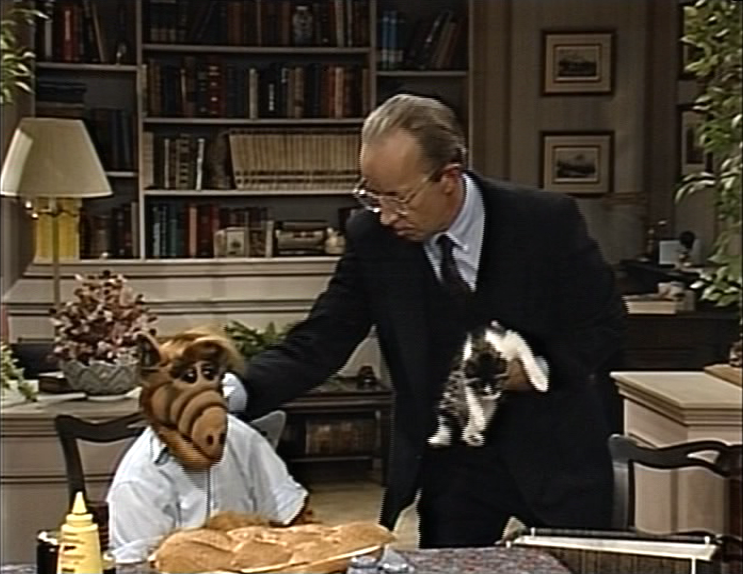
The family comes back from church, and Willie gives ALF the Vulcan Nerve Pinch with more conviction than I’ve ever seen from this actor before. Paul Fusco is lucky Max Wright hopped into his car and sped away as soon as they finished shooting the show’s final episode; had he stuck around for the wrap party I’m pretty sure he’d have killed the puppeteer with a tire iron.
ALF lies and says that the kittens came to attend Lucky’s funeral, which is a pretty decent attempt at a save. It makes no sense to us as human beings, but to ALF — who still doesn’t seem to grasp the concept of funerals at all, even though he’s attended more of them than I have by this point — the confusion is believable. One species on Earth may gather to mourn, so why is it so strange that he expects another to do the same?
Obviously, they know he’s a fucking liar. Kate expresses her disgust at the idea of ALF eating cats, and Schedeen plays it very well. It’s not funny, but she’s convincingly repulsed. It doesn’t go anywhere, but in isolation I like it. She’s being human.
Mr. Ochmonek knocks on the door, so I assume this scene will end before we get to see him. Fool me once, show, shame on you. Fool me twice…
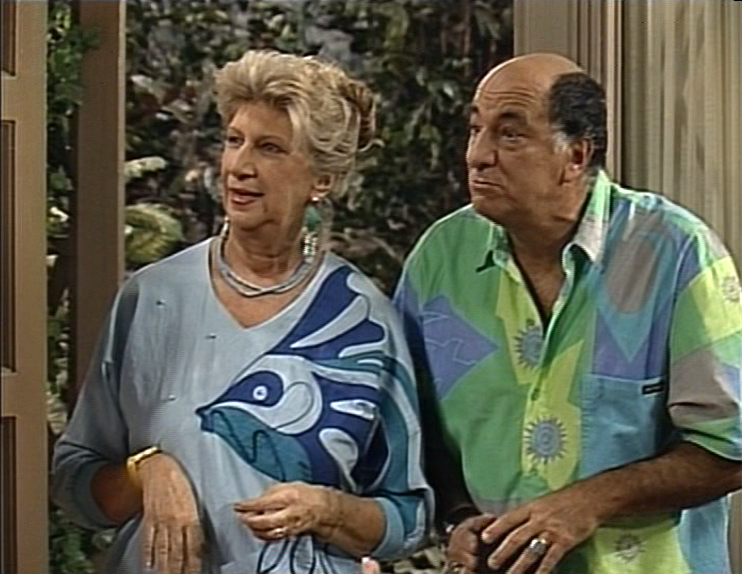
Oh.
You did fool me twice.
Anyway, the Ochmoneks are going to Malibu to hunt for treasure with their metal detector, and they want to see if the Tanner family (the whole fuckin’ Tanner family) would like to join them.
Tell me.
A-shitting-gain.
Who the bad neighbors are supposed to be.
Here we see these two taking a spontaneous little daytrip that I’m sure they’ll enjoy, and before they go they figure they might as well invite their neighbors along to have a nice afternoon out as well. What a pair of cunts, amirite?
Once again, the Ochmoneks go out of their way to show kindness to the Tanners. When’s the last time the Tanners even thought of the Ochmoneks without turning it into some kind of joke about how ugly / old / scummy they are?
It’s so strange. I’m supposed to see this and think it’d be a nightmare to live next to the Ochmoneks…but all they do is say nice things to the Tanners, buy them things, and bring them on trips. What is the Tanners’ god damned problem?
There’s a really nice exchange here, and it’s pretty funny, too. Willie mentions having some cats he needs to find homes for, but Mr. Ochmonek can’t take them because his wife is allergic. “She breaks out in these big, red welts that drip!” he explains.
“Trevor, please, some things are private,” she says. And I like this in itself, because it’s the kind of Ochmonek material that works: they say things without thinking. They’re not bad people (as much as the show would love us to believe otherwise); they just don’t behave in the most socially acceptable manner.
But it’s the punchline that I really love. He replies, “Then why did you pose for the cover of that medical journal?”
She says, “I was young. And I needed the money.”
And holy shit, in four lines of dialogue the Ochmoneks just weaved a funny little story more satisfying than almost anything else ALF has managed in 3 1/3 seasons. It’s nothing groundbreaking, but it’s efficient comedic work between two actors who understand timing and delivery.
In short, it’s okay material elevated by people who care about what they’re doing. We don’t see that often on ALF, and I always appreciate it when we do.
Willie tells them to fuck off.
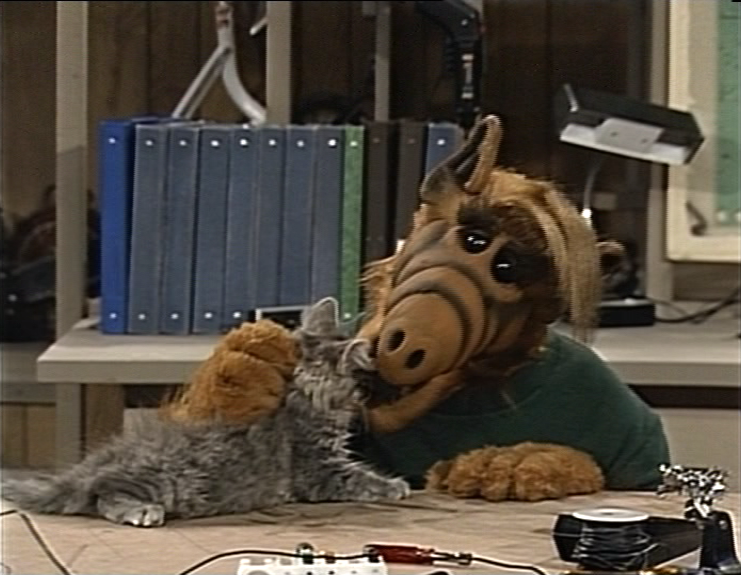
Later, in the shed, ALF attempts to eat one of the cats. He says, “Ready to go through with this?” and we cut to an insert of the cat violently shaking its head, as though someone flicked its ear off camera or something. It’s really fucking stupid.
I guess the cat can understand English? Bullshit, ALF. Make like a pair of really great neighbors and fuck off.
I find it interesting that the episode that seemed to be about Lucky’s death (and Brian’s reaction, which we’ve all but forgotten about at this point) is actually an episode about ALF finally getting his chance to eat a cat.
Like…it’s actually pretty cool that they took a believable everyday plot element (the death of a pet) and tied it into something the show’s been toying with passively from the very start (fucking eating a cat’s guts).
Granted, it’s not a very good episode, but whatever. I’m all about silver linings.
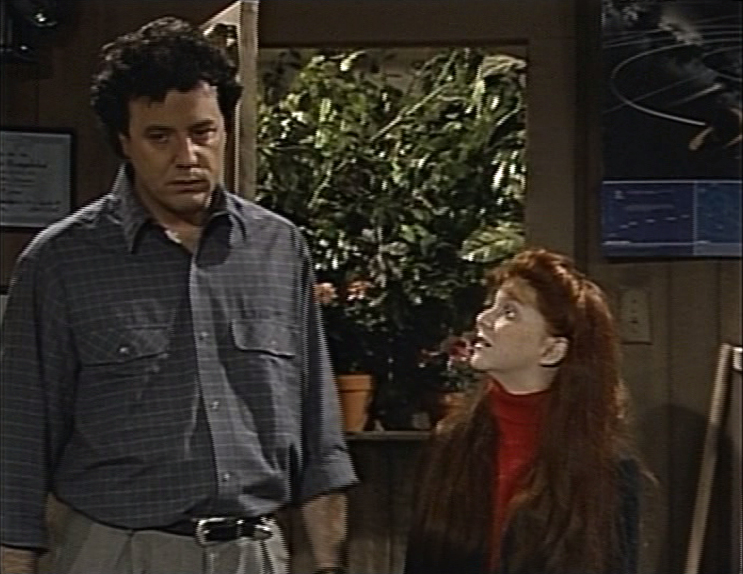
ALF hides because Kate leads some folks into the shed to look at the cats. This scene…is fucking awful.
It’s almost an exact recreation of a scene way back in “Looking for Lucky,” and that’s not going to do “Live and Let Die” any favors, as that scene was great. That’s the one where some little girl we never saw again demanded that ALF be murdered for her entertainment. How can you possibly top that?!
The setup and the dynamic here is copied wholesale from that scene: spoiled little girl and her distant dad show up to adopt a pet. It’s odd how similar it is (can the writers really think of only one situation when it comes to pet adoption?), but it’s nowhere near as good.
The girl here, in particular, is fucking atrocious. She’s so bad I could easily see her being added to the main cast.
She does this phony, elevated accent which I guess is supposed to be French. To the show’s credit, it annoys her father as much as it annoys me. But that doesn’t change the fact that it annoys me, and really I just keep hoping for ALF to beat her to death with a rake. (How’s that for a reversal?)
The girl is played by Emily Schulman, who had a few one-off appearances in shows like Mr. Belvedere and The Wonder Years, but it looks like her most substantial part was as Harriet in Small Wonder.
You know Small Wonder. That’s the show about the robot who looked like a little girl and would hilariously misinterpret basic commands. For example, somebody might say, “Hey Vicki, get the phone,” and she’d yank the telephone out of the wall and bring it to them. Or they’d say, “Hey Vicki, empty the dishwasher,” and she’d kill your dad with a lobster mallet. It was fucking terrible, and I’m tempted every year to make you watch it during the Xmas charity marathon.
Anyway, I think Harriet was the neighbor or something. I don’t remember, even though I watched way, way too much of that shit as a kid.
That’s one thing these ALF reviews have made me painfully aware of: I’ve spent way too much of my life watching really bad television. (And you people ARE NOT HELPING.)
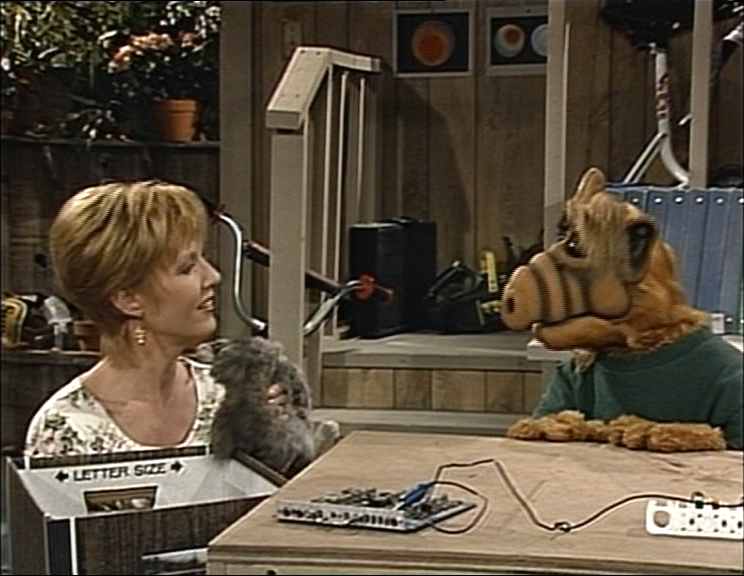
After they leave, ALF confesses to Kate that he loves cats. Kate — realistically, delivered like a woman who is truly sick of these jokes — says that she knows all about his “love for cats.”
But ALF means it; he can’t eat them because they’re too cute. He’s never seen a live kitten before, and now he’s not sure he can bring himself to actually consume one.
And, again, pretty crappy episode, but I like this. It’s well-enough observed, and it’s the same reason that a human being might stop eating meat. In fact, it’s not all that far removed from Lisa Simpson’s similar awakening after playing with a lamb on The Simpsons. (See? I watched good TV, too!) That was a show-changing event for The Simpsons, and ALF’s epiphany here has the potential to be even more of a shakeup to this show’s universe.
…okay, yes, ALF is ending in 15 weeks. But this guy deciding he doesn’t want to eat cats anymore is big. Like, massive. You know, since that’s pretty much his only shtick.
Neither Willie nor Kate believe him, though; they’re convinced that cats in the house will be too much of a temptation for him, so they keep giving the kittens away.
One thing about the screengrab above struck me as odd: Kate has physically come down to ALF’s level. Only now do I realize that that’s never (or very rarely) happened before. Brian is basically there already, and Willie and Lynn both get down on their knees for him (AHEM), but Kate tends to remain upright, above him, speaking (literally) down to him at all times. Whenever she does address him at eye level she bends at the waist, which has a very different social connotation than kneeling before someone.
I’m not at all complaining that she’s breaking that pattern here; I’m just noticing her usual behavior now that I see it contradicted…and it’s making me really like the physical acting choices Anne Schedeen has been making all along that I never picked up on.
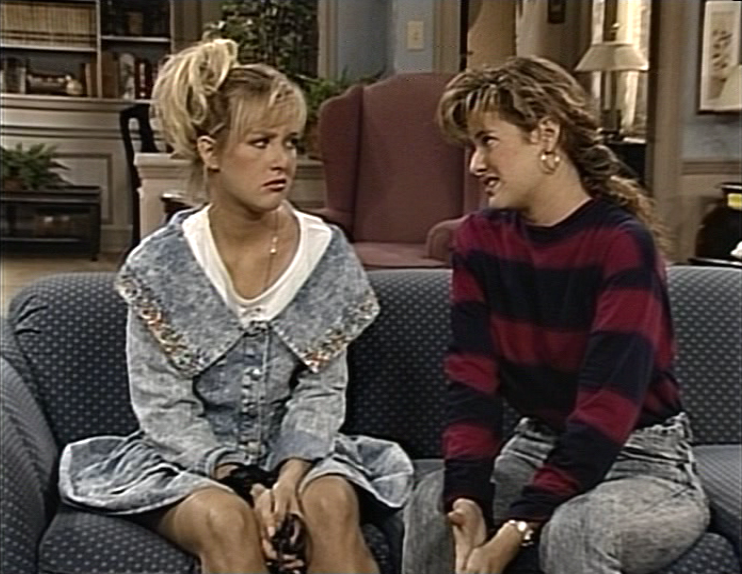
When only one cat remains, Lynn brings a friend over to get it, and…
I…need a moment.
Sorry…
Lynn…
…brings a friend…
…over to the house.
Holy. Shit.
This might be an even larger shakeup than ALF not eating cats anymore. Lynn has a friend! Like, an actual friend! One that doesn’t need the “with benefits” qualifier!
Her name is Joanie, and we get some chatter between them about how Joanie’s been dumped by a guy she only dated for a week. Already she got the guy’s name tattooed on her body (CHACHI), and Lynn reminds her that she should have taken things slowly. When you get the “take things slowly” speech from a girl who almost got married in a planetarium to someone nobody else ever met, you know your life is truly off the rails.
I’m a little disappointed this isn’t Julie, who’s been mentioned by Lynn a few times before and whom it would be very nice to confirm is not imaginary, but that’s okay. I’ll take what we can get.
I’m disappointed, though, that Joanie won’t be sticking around, because Lynn really needs a friend if she’s ever going to convince me that she’s not a mannequin who comes to life only when ALF is around. God knows I’d rather add this girl to the cast than Willie’s horny little brother.
Willie can’t find the cat for Joanie, though, so he confronts ALF in Eric’s room and asks where it is. (“Dhoooo I haff to-tear the hhousse a-paahhhrt!?“)
ALF replies that he ate it. This causes Willie to make the same face that your grandmother makes when you take the last peppermint candy:

Max Wright never showed appropriate concern in his entire acting career, and he’ll be fucked if he’s going to start now.
There’s some stupid Eric reaction shot in this scene, too, and I’m already sick to shit of cats and babies responding to ALF as though they understand him. For an episode so focused on the idea of cuteness conquering all, it’s really making me want to kill everybody involved with a box cutter.
He threatens ALF with serious punishment for this transgression, and then goes into the living room to say that something happened to the kitten and Joanie can’t have it. Jesus Christ…couldn’t this guy at least have tried to make an excuse?
Not that it matters; Joanie just leaves, as though Willie said something much less horrifying than he actually did.
Then he tells Lynn that ALF ate the cat, and Andrea Elson acts fucking circles around Max Wright.
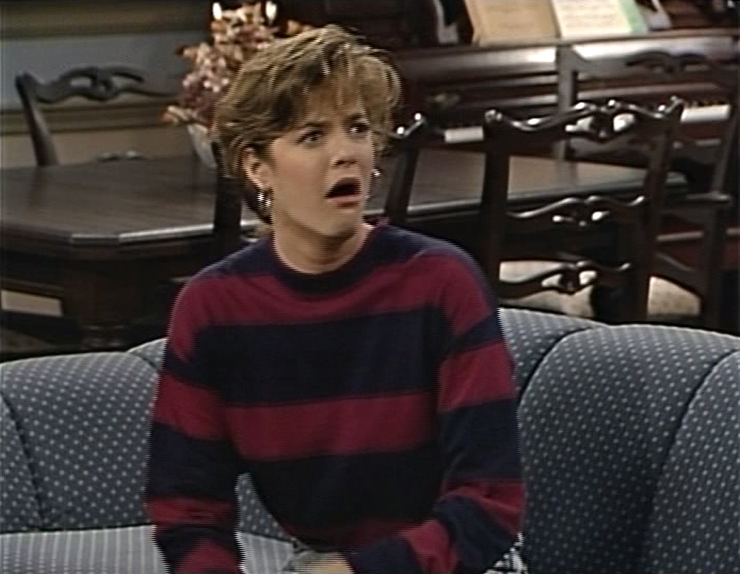
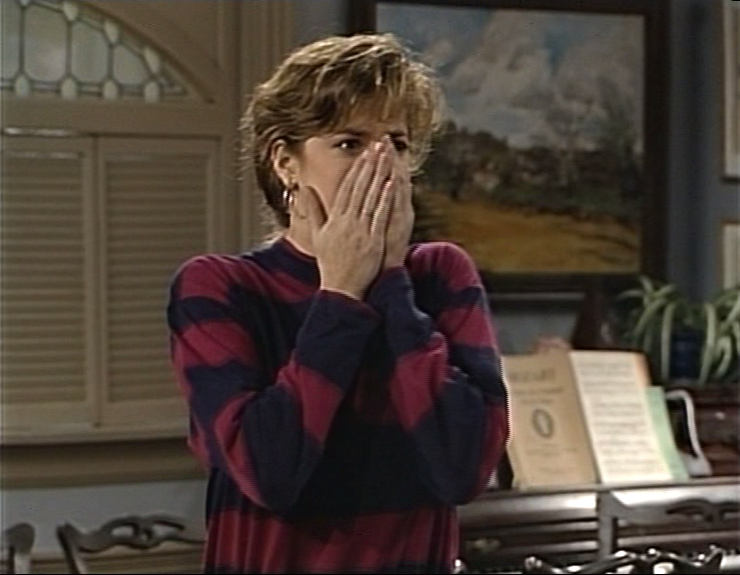
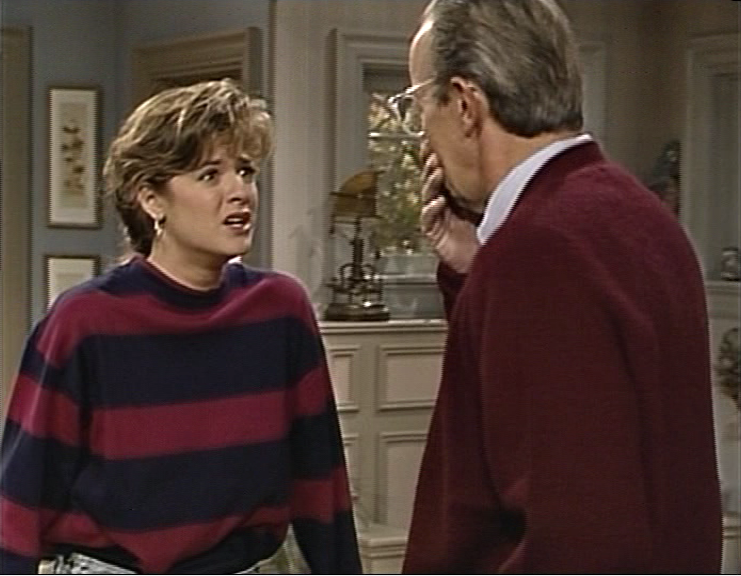
Look at that. She cycles through horror and disbelief and sadness, all in the span of a few seconds. She’s really grown as an actor since this show started, which makes me even more disappointed that this was the horse shit she was stuck in. Imagine if she actually got to work with some people who knew what they were doing.
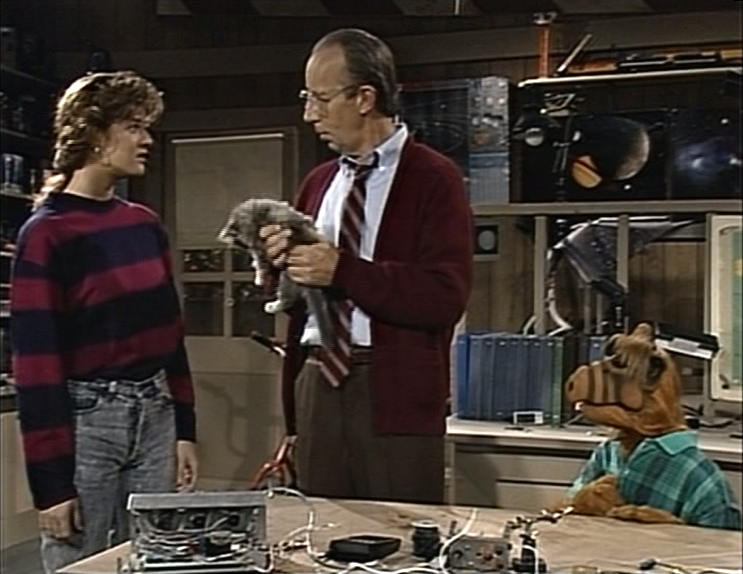
They head out to the shed and discover ALF hiding the cat.
Obviously they’re relieved that ALF didn’t eat the cat, but I’m just pissed off because it leads to a fucking third reaction shot of the kitten, this time licking itself.
They decide to let ALF keep the cat, and I think it’s safe to say that he doesn’t rip this one to shreds with his awful fangs before the show ends…which means he really did change his ways.
Fine.
My question, though: does this ALF-no-longer-eats-cats thing hold true in future ALF media?
The cartoon series doesn’t count, as that took place chronologically before any of this, so aside from that are we really done with cat-eating jokes forever?
The remaining episodes?
Project: ALF?
ALF’s Masturbatory Talk Show?
Somehow I doubt he stopped making jokes about eating cats, so maybe he really was pulling the long con with the Tanners on this one. Sure, that conclusion sort of undercuts the (attempted) sweetness of the episode, but the alternative is that ALF eventually said, “Fuck everything I’ve learned; I’m hungry,” which doesn’t do much to keep the sweetness alive, either.
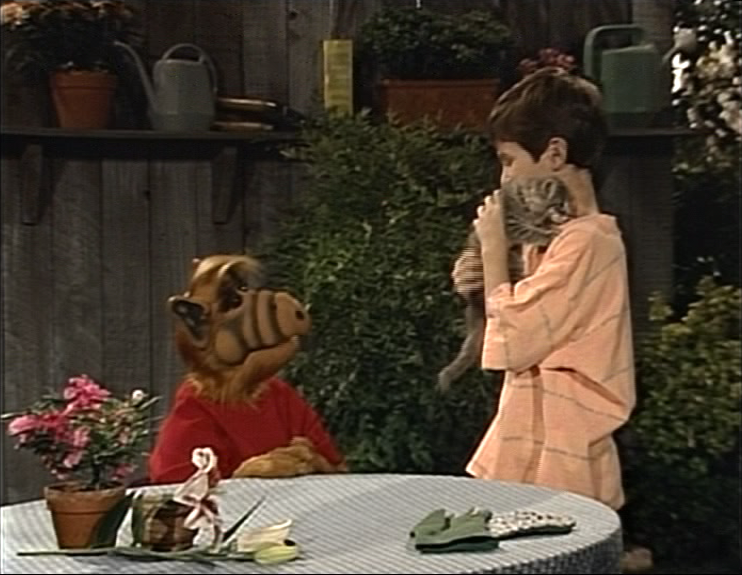
In the short scene before the credits, the writers remember that this episode had something to do with Brian at one point. ALF wants to name the cat Flipper, Brian names it Lucky II, and the episode ends.
Eh, I don’t care. This one could have been way worse, but it leaves me with one question for any cat lovers (spit) in the readership out there:
In the final scene, Brian holds the cat and pets it, and it purrs at him. I know enough about cats to know that that’s probably a good thing; the cat is cozy. (Correct me if I’m wrong.)
But when ALF holds him, the cat meows loudly and repeatedly.
Like, it never fucking stops until ALF puts it down.
That’s got to be bad, right? Like the cat fucking hates him? Granted, it wasn’t screaming and clawing his foam snout off or anything, but if purring signifies contentment, what’s the meowing? Fear? Confusion? Seething hatred?
So, yeah, “Live and Let Die.” It manages to be neither the best nor worst of the death episodes, and it somehow feels pointless in spite of the fact that it features the passing of a family member and an exploration and reversal of one of the show’s key tenets.
Leave it to ALF season four to render even the important things meaningless.
Countdown to ALF being immolated in front of the Tanners: 15 episodes
MELMAC FACTS: Melmacians who didn’t eat cat were considered sissies. (Lovely stuff, ALF.) Also, “cat lovers” were spat upon, literally.

